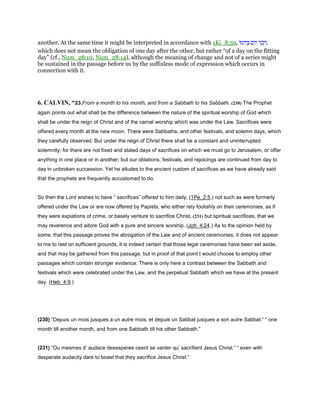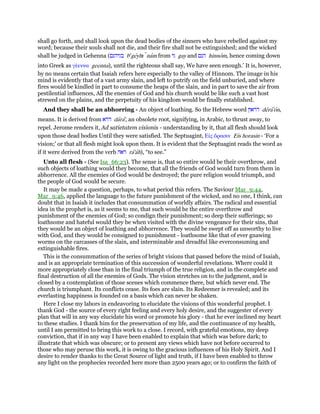This document provides commentary on Isaiah 66 from multiple scholars. It discusses how Isaiah emphasizes that God does not need a physical temple, as heaven is His throne and earth is His footstool. While the Jews took pride in the temple, God finds His rest in humble, contrite hearts. The commentary also examines how Isaiah condemned the intentions of most exiles to build the temple, as their hearts were not right with God and their worship would be offensive. Overall, the commentary provides historical and theological context for Isaiah's message about true worship of God and His judgment of hypocrisy.

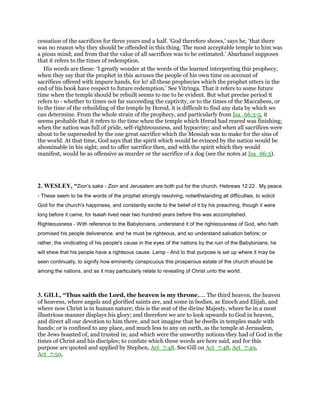

![dread of his justice and wrath. Such a heart is a living temple for God; he dwells there, and it is
the place of his rest; it is like heaven and earth, his throne and his footstool.
5. JAMISON, “Isa_66:1-24. The humble comforted, the ungodly condemned, at the Lord’s
appearing: Jerusalem made a joy on earth.
This closing chapter is the summary of Isaiah’s prophecies as to the last days, hence the
similarity of its sentiments with what went before.
heaven ... throne ... where is ... house ... ye build — The same sentiment is expressed,
as a precautionary proviso for the majesty of God in deigning to own any earthly temple as His,
as if He could be circumscribed by space (1Ki_8:27) in inaugurating the temple of stone; next, as
to the temple of the Holy Ghost (Act_7:48, Act_7:49); lastly here, as to “the tabernacle of God
with men” (Isa_2:2, Isa_2:3; Eze_43:4, Eze_43:7; Rev_21:3).
where — rather, “what is this house that ye are building, etc. — what place is this for My
rest?” [Vitringa].
6. K&D, “Although the note on which this prophecy opens is a different one from any that
has yet been struck, there are many points in which it coincides with the preceding prophecy.
For not only is Isa_65:12 repeated here in Isa_66:4, but the sharp line of demarcation drawn in
chapter 65, between the servants of Jehovah and the worldly majority of the nation with
reference to the approaching return to the Holy Land, is continued here. As the idea of their
return is associated immediately with that of the erection of a new temple, there is nothing at all
to surprise us, after what we have read in Isa_65:8., in the fact that Jehovah expresses His
abhorrence at the thought of having a temple built by the Israel of the captivity, as the majority
then were, and does so in such words as those which follow in Isa_66:1-4 : “Thus saith Jehovah:
The heaven is my throne, and the earth my footstool. What kind of house is it that ye would
build me, and what kind of place for my rest? My hand hath made all these things; then all
these thing arose, saith Jehovah; and at such persons do I look, at the miserable and broken-
hearted, and him that trembleth at my word. He that slaughtereth the ox is the slayer of a
man; he that sacrificeth the sheep is a strangler of dogs; he that offereth a meat-offering, it is
swine's blood; he that causeth incense to rise up in smoke, blesseth idols. As they have chosen
their ways, and their soul cheriseth pleasure in their abominations; so will I choose their ill-
treatments, and bring their terrors upon them, because I called and no one replied, I spake and
they did not hear, and they did evil in mine eyes, and chose that in which I took no pleasure."
Hitzig is of opinion that the author has broken off here, and proceeds quite unexpectedly to
denounce the intention to build a temple for Jehovah. Those who wish to build he imagines to
be those who have made up their minds to stay behind in Chaldea, and who, whilst their
brethren who have returned to their native land are preparing to build a temple there, want to
have one of their own, just as the Jews in Egypt built one for themselves in Leontopolis. Without
some such supposition as this, Hitzig thinks it altogether impossible to discover the thread
which connects the different vv. together. This view is at any rate better than that of Umbreit,
who imagines that the prophet places us here “on the loftiest spiritual height of the Christian
development.” “In the new Jerusalem,” he says, “there will be no temple seen, nor any sacrifice;
Jehovah forbids these in the strongest terms, regarding them as equivalent to mortal sins.” But
the prophet, if this were his meaning, would involve himself in self-contradiction, inasmuch as,
according to Isa_56:1-12 and 60, there will be a temple in the new Jerusalem with perpetual
sacrifice, which this prophecy also presupposes in Isa_66:20. (cf., Isa_66:6); and secondly, he
would contradict other prophets, such as Ezekiel and Zechariah, and the spirit of the Old](https://image.slidesharecdn.com/isaiah66commentary-150114082304-conversion-gate01/85/Isaiah-66-commentary-4-320.jpg)


![The inward and spiritual preferred by God to the outward and material
[These great words] are a declaration, spoken probably in view of the approaching restoration of
the temple (which, in itself, the prophet entirely approves, Isa_44:28, and expects, Isa_56:7;
Isa_55:7; Isa_62:9),reminding the Jews of the truth which a visible temple might readily lead
them to forget, that no earthly habitation could be really adequate to Jehovah’s majesty, and
that Jehovah’s regard was not to be won by the magnificence of a material temple, but by
humility and the devotion of the heart. How needful the warning was history shows. Jeremiah
(Jer_7:1-15) argues at length against those who pointed, with a proud sense of assurance, to the
massive pile of buildings that crowned the height of Zion, heedless of the moral duties which
loyalty to the King, whose residence it was, implied. And at a yet more critical moment in their
history, attachment to the temple, as such, was one of the causes which incapacitated the Jews
from appropriating the more spiritual teaching of Christ: the charge brought against Stephen
(Act_6:13-14)is that he ceased not “to speak words against this holy place and the law;” and, the
argument of Stephen’s defence (Act_7:1-60.) is just to show that in the past God’s favour had
not been limited to the period during which the temple of Zion existed. Here, then, the prophet
seizes the occasion to insist upon the necessity of a spiritual service, passing on (verses 3-5) to
denounce, in particular, certain superstitious usages which had apparently, at the time, infected
the worship of Jehovah. (Prof. S. R. Driver, D. D.)
The inwardness of religion
1. The tendency to make religion consist in external actions, apart from the inward
dispositions which should accompany them, is very common. The reason for this is
discovered from the fact that outward actions are easier than inward. It is easier, for
instance, to become outwardly poor than to become poor in spirit; easier to adore with the
body than to worship with the soul. The tendency is observable in all dispensations. For
instance, whatever other differences there may have been between the sacrifices of Cain and
Abel, we are expressly told that it was “by faith Abel offered unto God a more excellent
sacrifice ‘ (Heb_11:4). The outward act was linked with the right inward disposition. So,
again, in the time of the Levitical Law, the tendency often manifested itself to put ceremonial
above moral obligations (Psa_1:1-6.). And Isaiah, in his first chapter (verses 11-18), shows
how an outward service, without the putting away of evil, is an abomination to God. In the
same way our Lord condemned the Pharisees Mat_15:8).
2. This closing prophecy of Isaiah seems to contain a warning against formalism. It is not
that the outward is unimportant, for this would be to run from one extreme to the other, but
that the outward will not avail. The return of Israel from captivity will be followed by the
building of a new temple, as the event has shown; and the warning of the text is twofold—
one, to remind the Israelites that Jehovah had no need of a temple; the other, to impress
them with a truth they were very apt to forget, that religion must be a matter of the heart.
I. A REVELATION OF GOD. “Heaven is My throne, and the earth is My footstool.”
1. These words, or the substance of them, are again and again repeated in Holy Scripture
(1Ki_8:27; Mat_5:34; Act_7:49). Repetitions in the Bible show the importance of a truth, or
our difficulty in remembering it.
2. What is the truth? That God is incomprehensible. He is everywhere and cannot be
localized (Jer_23:24). There is nowhere where Cod’s power and essence and presence do not
reach. He knows no limit of space or time, of knowledge or love.
II. THE REFERENCE TO THE EXTERNAL TEMPLE. “Where is the house that ye build unto
Me?”](https://image.slidesharecdn.com/isaiah66commentary-150114082304-conversion-gate01/85/Isaiah-66-commentary-7-320.jpg)


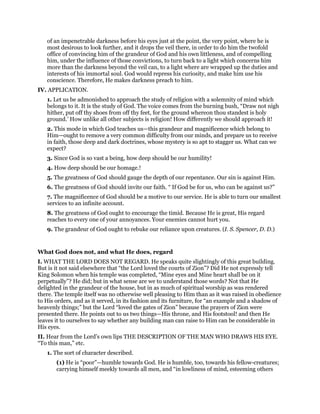

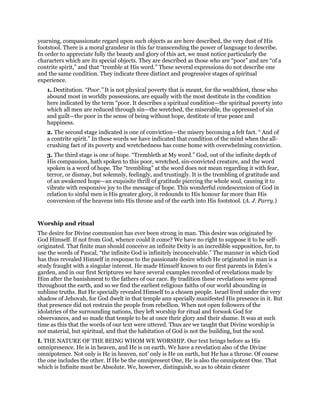
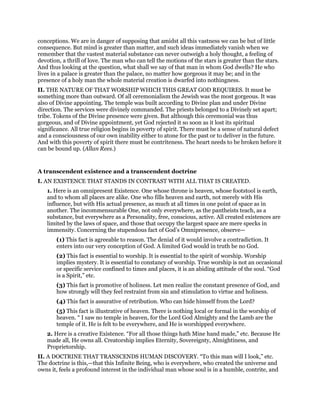

![3. Acceptance.
4. Affection.
5. Benediction. (C. H. Spurgeon.)
The greatness and condescension of God
That is an excellent answer which was given by a poor man to a sceptic who attempted to
ridicule his faith. The scoffer said, “Pray, sir, is your God a great God or a little God? The poor
man replied, “Sir, my God is so great that the heaven of heavens cannot contain Him; and yet He
condescends to be so little, that He dwells in broken and contrite hearts. Oh, the greatness of
God, and the condescension of God! (C. H. Spurgeon.)
8. KELLY, “The concluding chapter of our prophet pursues what was begun in Isa. 65. - the answer
of Jehovah to the supplication which precedes them both.
"Thus saith Jehovah, the heavens [are] my throne, and the earth [is] my footstool: what [is] the house
that ye will build unto me? and where [is] the place of my rest? Even all those [things] hath my hand
made, and all those [things] have been, saith Jehovah" (vv. 1, 2). It is not that God did not accept the
house which king David desired, and his son Solomon was given, to erect for His glory. It is not that He
will not have a sanctuary in the midst of Israel in the glorious land; for He has revealed it minutely,
with the feasts, sacrifices, priests, and appurtenances, by Ezekiel (Ezek. 40 - 48).
But it is another thing when His people, despising the only Saviour and Lord, their own Messiah, rest
in the sanctuary, as of old in the ark to their own shame and discomfiture before their enemies. So it
was when the Lord left the temple - no longer God's house but theirs, and left to them desolate,
Himself its true glory being despised and rejected. So Stephen charged home on them these very
words (Act_7:48-50). It was not he nor Luke, but Isaiah who declared that the Most High dwells not in
temples made with hands: and this in full view of the "exceeding magnifical" temple which Solomon
built. Heaven is His throne, earth is His footstool. What can man do worthily for Him to rest in? He
needs nothing of human resources. His own hand has made all these things, in comparison with which
man's greatest exertions are puny indeed.
Once more among the Jews at the end of the age shall be the state of things which draws out this
rebuke of their own prophet. Trusting in the house that they are at length allowed to build in](https://image.slidesharecdn.com/isaiah66commentary-150114082304-conversion-gate01/85/Isaiah-66-commentary-15-320.jpg)
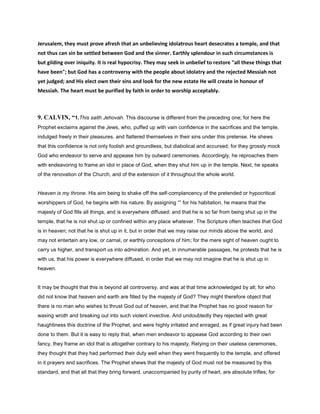
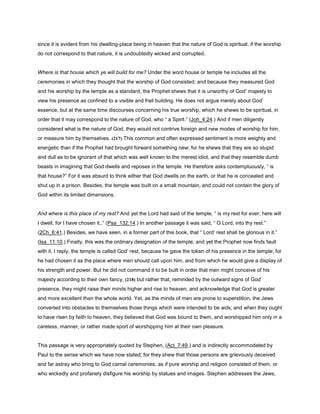


![looks to them in him, and has a gracious regard for them: they also may be described as "poor";
poor in spirit, spiritually poor, as they see and own themselves to be, and seek to Christ for the
riches of grace and glory, which they behold in him, and expect from him; and are both "afflicted
and humble", and become the one by being the other;
and of a contrite spirit, their hard hearts being broken by the Spirit and word of God, and
melted by the love and grace of God; and so contrite, not in a mere legal, but evangelical
manner:
and such tremble at the Word of God; not at the threatenings of wrath in it, or in a servile
slavish manner; but have a holy reverence for it (o), and receive it, not as the word of man, but
as the word of God: and to such the Lord looks; he looks on these poor ones, and feeds them; on
these afflicted ones, and sympathizes with them; on these contrite ones, and delights in their
sacrifices, and dwells with them, and among them; see Psa_51:17.
4. CHARELES SIMEON, “THE POOR AND CONTRITE THE OBJECTS OF GOD’S FAVOUR
Isa_66:2. To this man will I look, even to him that it poor and of a contrite spirit, and trembleth at my word.
IT often happens that accidental distinctions serve men as grounds of confidence towards God. Many
found their hopes on no better basis than Micah did [Note: Jdg_17:13.]: the Jews in particular thought
themselves assured of the Divine favour because of God’s residence in their temple [Note: Hence that
common boast among them, Jer_7:4.]. But God shews them the folly of their notions [Note: ver. 1, 2. The
import of which is, How can you think that I, an infinite Being, who myself created those things of which
you boast, can be allured by an earthly structure to continue my presence among you, if you persist in
your evil ways?], and declares the character of those who alone shall be considered by him with any
favourable regard:
I. Who are the objects of the Divine favour—
Men choose for their companions the rich and gay; but those whom God regards are of a very different
character—
1. They feel themselves destitute of all good—
[It is not temporal, but spiritual poverty, that distinguishes God’s people. They have discovered their total
want of spiritual wisdom [Note: Pro_30:2-3.]. They are constrained to acknowledge that they have
norighteousness of their own [Note: Isa_64:6.], and that they an “without strength” for obedience
[Note: Rom_5:6. 2Co_3:5.]. They unfeignedly adopt the language of St. Paul [Note: Rom_7:18.]— Nor do](https://image.slidesharecdn.com/isaiah66commentary-150114082304-conversion-gate01/85/Isaiah-66-commentary-20-320.jpg)
![they hope for mercy but as the free gift of God [Note: They say not, like the servant, Mat_18:26. but
desire to experience the clemency shewn to insolvent debtors, Luk_7:42.].]
2. They bewail the many evils they have committed—
[They hare been made to see that sin is hateful to God; and they have felt the bitterness of it in their own
consciences. They know experimentally the sensations of David [Note: Psa_38:4; Psa_38:6;Psa_38:8.].
They lothe themselves for all their abominations [Note: Eze_36:31.]. Nor are their convictions merely
occasional or transient; they are habitually of a tender and “contrite spirit.”]
3. They pay a reverential regard to every word of God—
[They dare not say like the idolatrous Jews [Note: Jer_44:16.]— They rather resemble the man after
God’s own heart [Note: Psa_119:161.]. If the word be preached, they “receive it as the word, not of man,
but of God.” They hear the threatenings like the meek Josiah [Note: 2Ch_34:19; 2Ch_34:27.]. They
attend to the promises with an eager desire to embrace them. To every precept they listen with an
obedient ear [Note: Like Cornelius, Act_10:33 and Paul, Act_22:10. yes, the angels in
heaven, Psa_103:20.].]
These, though generally considered by the world as weak and superstitious, are not overlooked by the
Supreme Being.
II. The peculiar regard which God shews them—
The “eyes of God are in every place beholding the evil and the good;” but he “looks to” these, in a far
different manner from others. This distinguishing favour implies,
1. Approbation of them—
[From the proud and self-sufficient God turns his face [Note: Jam_4:6.]; but he “despises not the broken
and contrite in heart [Note: Psa_51:17.].” Though so exalted in himself, he will not disdain to notice them.
His approbation of such characters stands recorded for ever [Note: Luk_18:13-14.]. His reception of the
prodigal is an eternal monument of the regard he will shew to entry repenting sinner.]
2. Care over them—](https://image.slidesharecdn.com/isaiah66commentary-150114082304-conversion-gate01/85/Isaiah-66-commentary-21-320.jpg)
![[Wherever they go, his eye is upon them for good [Note: 2Ch_16:9.]. He watches them in order to deliver
them from danger [Note: Psa_12:5.]. He watches them in order to comfort them in trouble
[Note:Psa_147:3.]. He watches them in order to relieve them in want [Note: Isa_41:17-18.]. He watches
them in order to exalt them to happiness and honour [Note: 1Sa_2:8.].]
3. Delight in them—
[There are none on earth so pleasing to God as broken-hearted sinners. Their sighs and groans are as
music in his ears [Note: Psa_102:19-20.]. Their tears he treasures up in his vial [Note: Psa_56:8.]. He
dwells with them as his dearest friends [Note: Isa_57:15.]. He rejoices over them as a people in whom he
greatly delights [Note: Zep_3:12; Zep_3:17.]. He saves them here by the unceasing exercise of his power
[Note: Psa_34:15; Psa_34:18.]; and reserves for them hereafter an inheritance in heaven
[Note: Mat_5:3.].]
Nor shall the fewness of such characters render them at all less the objects of God’s regard—
[It must be acknowledged that they are but few. But if there were only one in the whole world, God would
find him out [Note: “To this man, &c. even to him,” &c.]. Not all the splendour of heaven, nor all the
acclamations of angels, should for a moment divert God’s attention from him. Though he were despised
by all the human race, yet should he be amiable in the eyes of his Maker. Nor should he want any thing in
time or eternity. Never shall that declaration in any instance be falsified [Note: Psa_138:6.]—]
Infer—
1. How should we admire the condescension of God!—
[If we view only the material world we may well stand astonished that God should regard such an
insignificant creature as man [Note: Psa_8:3-4.]. But, if we contemplate the majesty of God, we cannot
but exclaim with Solomon [Note: 1Ki_8:27.]— Let then the declaration in the text lead our thoughts up to
God. Let us adore him for so clearly describing the objects of his favour. And let us express our
admiration in the words of David [Note: Psa_113:5-8.]—]
2. How should we desire to attain the character that is pleasing to God!—
[The pool and contrite are exclusively beloved of God. If he look on others, it is only as he did on the
Egyptians [Note: Exo_14:24-25.]. And how dreadful must it be to have such an enemy! But how delightful](https://image.slidesharecdn.com/isaiah66commentary-150114082304-conversion-gate01/85/Isaiah-66-commentary-22-320.jpg)
![to have an almighty, omnipresent guardian! Above all, how awful must it be to have him turn his face from
us in the day of judgment! Let us then endeavour to humble ourselves before God [Note: Isa_2:11.]. And
rest assured that the promised mercy shall in due time be fulfilled to us [Note: Jam_4:10.].]
5. JAMISON, “have been — namely, made by Me. Or, absolutely, were things made; and
therefore belong to Me, the Creator [Jerome].
look — have regard.
poor — humble (Isa_57:15).
trembleth at ... word — (2Ki_22:11, 2Ki_22:19; Ezr_9:4). The spiritual temple of the heart,
though not superseding the outward place of worship, is God’s favorite dwelling (Joh_14:23). In
the final state in heaven there shall be “no temple,” but “the Lord God” Himself (Rev_21:22).
6. KELLY, “"But to this [man] will I look, to the afflicted and contrite in spirit, and trembling at my
word" (v. 2). Thus the line is drawn here as before between a godly remnant, and the people apostate
as a whole. Hence their oblations are vain. "He that killeth an ox slayeth a man; he that sacrificeth a
lamb breaketh a dog's neck; he that offereth an oblation [is as] swine's blood; he that burneth incense
[is as] he that blesseth an idol. As they have chosen their own ways, and their soul delighteth in their
abominations, I also will choose their delusions, and will bring their fears upon them; because when I
called, none did answer; when I spake, they did not hear: but they did the evil in mine eyes, and chose
[that] wherein I delight not" (vv. 3, 4).
7. CALVIN, “2.Yet my hand hath made all these things. The Prophet refutes the false opinion which
men form about the worship of God, by thinking that sacrifices and outward ceremonies are of great value
in themselves; for the state of the question is this. God cares nothing about ceremonies, but they are
empty and useless masks, when men think that they satisfy God by means of them. When he says that
he made all these things, this must not be understood as referring solely to the temple, but to all that was
there offered to God. Now he says that he “ all these things,” in order that men may know that God has no
need of this external worship, as he declares (Psa_50:10) that all the animals were created by him, and
are his own, though by sacrifices of them the Jews hoped to obtain his favor. But foolish mortals have this
disease deeply seated in them, that they transform God according to their inclination, though he
appointed external worship not for his sake, but for our advantage; that is, that we may be trained by it
according to the capacity of our flesh.
And all these things began to be. It is the same as if he had said that he must not be compared to these
things, which at one time began to be; for he is eternal and had no beginning. “ could dispense with your](https://image.slidesharecdn.com/isaiah66commentary-150114082304-conversion-gate01/85/Isaiah-66-commentary-23-320.jpg)

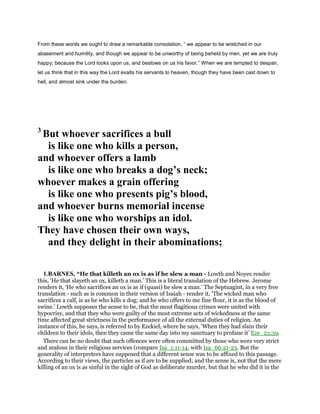
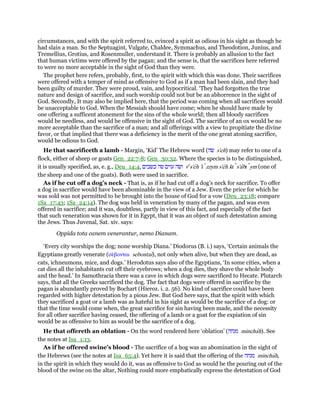

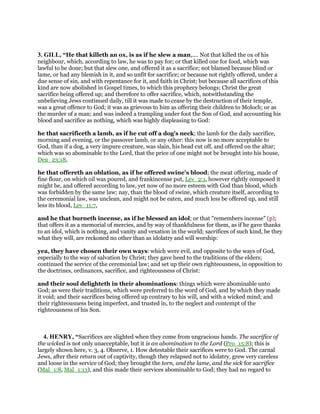



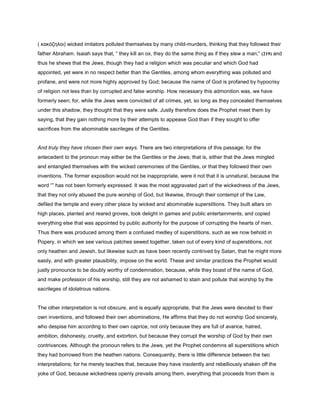




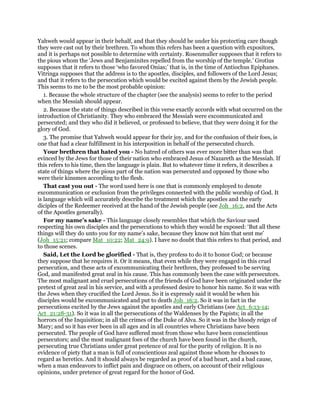
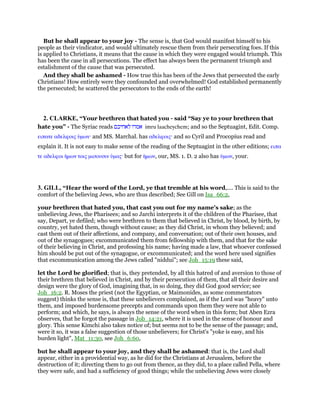







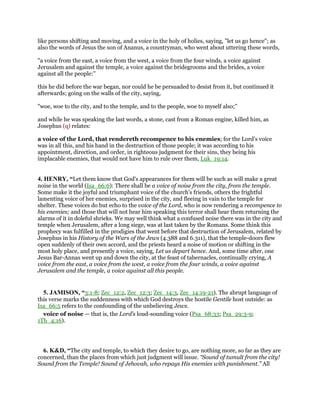
![three ,קול to the second of which אוֹן ָשׁ must be supplied in thought, are in the form of
interjectional exclamations (as in Isa_52:8). In the third, however, we have omitted the note of
admiration, because here the interjectional clause approximates very nearly to a substantive
clause (“it is the sound of Jehovah”), as the person shouting announces here who is the
originator and cause of the noise which was so enigmatical at first. The city and temple are
indeed still lying in ruins as the prophet is speaking; but even in this state they both preserve the
holiness conferred upon them. They are the places where Jehovah will take up His abode once
more; and even now, at the point at which promise and fulfilment coincide, they are in the very
process of rising again. A loud noise (like the tumult of war) proceeds from it. It is Jehovah, He
who is enthroned in Zion and rules from thence (Isa_31:9), who makes Himself heard in this
loud noise (compare Joe_3:16 with the derivative passage in Amo_1:2); it is He who awards
punishment or reckons retribution to His foes. In other cases מוּלְ (שׁהיב ֵ)ה ם ֵ ִשׁ generally means to
repay that which has been worked out (what has been deserved; e.g., Psa_137:8, compare
Isa_3:11); but in Isa_59:18 ge
mul was the parallel word to chemah, and therefore, as in Isa_35:4,
it did not apply to the works of men, but to the retribution of the judge, just as in Jer_51:6,
where it is used quite as absolutely. We have therefore rendered it “punishment;” “merited
punishment” would express both sides of this double-sided word. By “His enemies,” according
to the context, we are to understand primarily the mass of the exiles, who were so estranged
from God, and yet withal so full of demands and expectations.
7. KELLY 6-14, “But hark, what is this that breaks on the ear? "A voice of noise from the city, a
voice from the temple, a voice of Jehovah that rendereth recompense to his enemies. Before she
travailed, she brought forth; before her pain came, she was delivered of a man-child. Who hath heard
such a thing? who hath seen such things? Shall a land be made to bring forth in one day? shall a
nation be born at once? for as soon as Zion travailed, she brought forth her children. Shall I bring to
the birth, and not cause to bring forth? saith Jehovah: shall I cause to bring forth, and shut [the
womb]? saith thy God. Rejoice with Jerusalem, and be glad with her, all ye that love her; rejoice for
joy with her, all ye that mourn over her; because ye shall suck and be satisfied with the breasts of her
consolations, because ye shall drink out, and be delighted with the abundance of her glory. For thus
saith Jehovah, Behold, I will extend peace to her like a river, and the glory of the nations like a flowing
stream and ye shall suck, ye shall be borne upon the side, and be dandled upon the knees. As one
whom his mother comforteth, so will I comfort you; and ye shall be comforted in Jerusalem. And ye
shall see [this], and your heart shall rejoice, and your bones shall flourish like the grass: and the hand
of Jehovah shall be known toward his servants, and indignation toward his enemies" (vv. 6-14).
Thus no longer by testimony to the heart, but by manifest judgement will Jehovah decide between
cattle and cattle. The infidel scoff, which so long harassed the heavenly people, will then be put to
shame before the poor in spirit of the earthly people. It is not the gospel that is here described, but
the effect of the Lord's taking His great power and reigning, according toRev. 11: 15 18. It is the world-](https://image.slidesharecdn.com/isaiah66commentary-150114082304-conversion-gate01/85/Isaiah-66-commentary-47-320.jpg)







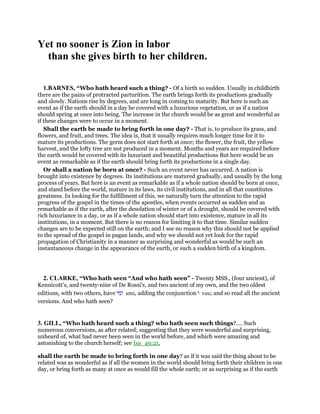
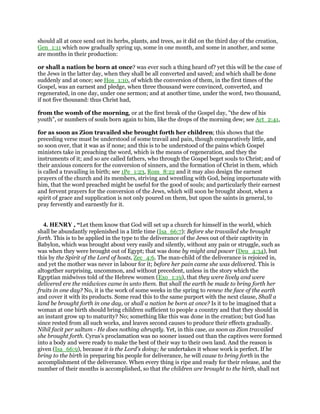
![I then give strength to bring forth, but leave mother and babe to perish together in the most
miserable case? How will this agree with the divine pity? Shall I begin a work and not go
through with it? How will that agree with the divine power and perfection? Am I he that causes
to bring forth (so the following clause may be read) and shall I restrain her? Does God cause
mankind, and all the species of living creatures, to propagate, and replenish the earth, and will
he restrain Zion? Will he not make her fruitful in a blessed offspring to replenish the church?
Or, Am I he that begat, and should I restrain from bringing forth? Did God beget the
deliverance in his purpose and promise, and will he not bring it forth in the accomplishment and
performance of it? But this was a figure of the setting up of the Christian church in the world,
and the replenishing of that family with children which was to be named from Jesus Christ.
When the Spirit was poured out, and the gospel went forth from Zion, multitudes were
converted in a little time and with little pains compared with the vast product. The apostles,
even before they travailed, brought forth, and the children born to Christ were so numerous, and
so suddenly and easily produced, that they were rather like the dew from the morning's womb
than like the son from the mother's womb, Psa_110:3. The success of the gospel was
astonishing; that light, like the morning, strangely diffused itself till it took hold even of the ends
of the earth. Cities and nations were born at once to Christ. The same day that the Spirit was
poured out there were 3000 souls added to the church. And, when this glorious work was once
begun, it was carried on wonderfully, beyond what could be imagined, so mightily grew the
word of God and prevailed. He that brought to the birth in conviction of sin caused to bring
forth in a thorough conversion to God.
5. JAMISON, “earth — rather, to suit the parallelism, “is a country (put for the people in it)
brought forth in one day?” [Lowth]. In English Version it means, The earth brings forth its
productions gradually, not in one day (Mar_4:28).
at once — In this case, contrary to the usual growth of the nations by degrees, Israel starts
into maturity at once.
for — rather, “is a nation born at once, that Zion has, so soon as she travailed, brought forth?”
[Maurer].
6. K&D, “All of these fall victims to the judgment; and yet Zion is not left either childless or
without population. “Before she travailed she brought forth; before pains came upon her, she
was delivered of a boy. Who hath heard such a thing? Who hath seen anything like it? Are men
delivered of a land in one day? or is a nation begotten at once? For Zion hath travailed, yea,
hath brought forth her children. Should I bring to the birth, and not cause to bring forth? saith
Jehovah: or should I, who cause to bring forth, shut it? saith thy God.” Before Zion travaileth,
before any labour pains come upon her (chebhel with tzere), she has already given birth, or
brought with ease into the world a male child (hı̄mlit like millet, in Isa_34:15, to cause to glide
out). This boy, of whom she is delivered with such marvellous rapidity, is a whole land full of
men, an entire nation. The seer exclaims with amazement, like Zion herself in Isa_49:21, “who
hath heard such a thing, or seen anything like it? is a land brought to the birth (hayuchal
followed by 'erets for hathuchal, as in Gen_13:6; Isa_9:18; Ges. §147), i.e., the population of a
whole land (as in Jdg_18:30), and that in one day, or a nation born all at once (yivvaled, with
munach attached to the kametz, and metheg to the tzere)? This unheard-of event has taken](https://image.slidesharecdn.com/isaiah66commentary-150114082304-conversion-gate01/85/Isaiah-66-commentary-57-320.jpg)
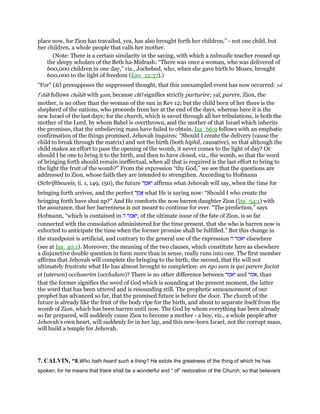


![Son, taken into covenant, and redeemed by his blood, shall be begotten again to a lively hope of
a glorious inheritance; God will not shut the womb of conversion until they are all brought to
faith in Christ, and repentance towards God. He will beget many more sons and daughters; and
he will cause the fulness of the Gentiles to be brought forth and brought in, and convert his
ancient people the Jews; all his promises shall be performed, and all prophecies relating to these
things shall be accomplished.
4. WHEDON, “8, 9. Sworn by hand arm — Possibly in answer to the foregoing provided-for
intercessions, Jehovah swears by “hand” and “arm” — symbols of strength — pledging infinite power to
fulfil his promise.
Possibly this wrought an effect which may be paraphrased as follows: “As I am the eternal Jehovah, I
never more will suffer Zion’s enemies, near or far, home or foreign, within or without, to plunder or cut off
her supplies of corn and wine, both of which herself alone shall forever enjoy in the spirit of praise in
the courts of my holiness.” Enemies, abroad or near at hand, may here represent Zion’s moral foes or
hinderances, within or without; and “corn” and “wine” are symbols of abounding spiritual sustenance and
joy.
5. JAMISON, “cause to bring forth, and shut — rather, “Shall I who beget, restrain the
birth?” [Lowth], (Isa_37:3; Hos_13:13); that is, Shall I who have begun, not finish My work of
restoring Israel? (1Sa_3:12; Rom_11:1; Phi_1:6).
shut — (compare Rev_3:7, Rev_3:8).
6. CALVIN, “9.Do I bring to the birth? As in the preceding verse he extolled in lofty terms the work of
God, so he now shews that it ought not to be thought incredible, and that we ought not to doubt of his
power, which surpasses all the order of nature; for, if we consider who it is that speaks, and how easy it is
for him to perform what he has promised, we shall not remain in such uncertainty as not instantly to
recollect that the renewal of the world is in the hand of him, who would have no difficulty in creating a
hundred worlds in a moment. A little before, by a burst of astonishment, he intended to magnify the
greatness of the work. But now, lest the minds of good men should be perplexed or embarrassed, he
exhorts them to consider his strength; and, in order that he may more fully convince them that nothing is
so difficult in the eyes of men as not to be in his power and easily performed by him, he brings forward
those things which we see every day; for in a woman’ bringing forth a child we see clearly his wonderful
power. Shall not the Lord manifest himself to be far more wonderful in enlarging and multiplying the
Church, which is the principal theater of his glory? It is therefore exceedingly wicked to limit his strength,
by believing that he is less powerful, when he shall choose to act directly and by openly stretching out his
hand, than when he acts by natural means.](https://image.slidesharecdn.com/isaiah66commentary-150114082304-conversion-gate01/85/Isaiah-66-commentary-61-320.jpg)

![prophet is speaking, both in this and the preceding chapter: and so sudden will be its arrival, that it will
seem as if “a nation were born in a day.” To this period we should look forward with joy: and whatever
occasions there may be for sorrow, on account of existing circumstances, the prospect of such a glorious
event should fill us with heavenly consolation.
That we may enter more fully into the exhortation in our text, we shall set before you,
I. A general view of the consolations which God has prepared for his people—
God delights in the character of a comforter: he calls himself “The Comforter of all them that are cast
down:” yea, each person of the ever-blessed Trinity is expressly designated by this title: “The God and
Father of our Lord Jesus Christ is the Father of mercies, and the God of all comfort [Note: 2Co_1:3.]:” The
Lord Jesus is “the Consolation of Israel [Note: Luk_2:25.]:” and the Holy Spirit is yet more particularly
made known to us as “The Comforter, (that other Comforter,) whom the Father will send to us in Christ’s
name [Note: Joh_14:16; Joh_14:26.].” And well is God set forth under this character, since he has
prepared most abundant and “everlasting consolation” for us,
1. In the work and offices of his Son—
[What is there which fallen man can want, that is not treasured up for us in the Lord Jesus Christ? Are we
ignorant, guilty, polluted, and enslaved? “Christ is of God made unto us wisdom, and righteousness, and
sanctification, and redemption [Note: 1Co_1:30.]:” he is a Priest, on purpose to make atonement for us;
a Prophet, on purpose to teach us by his word and Spirit; a King, on purpose that he may rule over us
and in us. In a word, there is “all fulness treasured up in Him [Note: Col_1:19.],” in order that we may
“receive out of His fulness grace for grace [Note: Joh_1:16.].” Hence the Apostle, assuming it as an
obvious and acknowledged truth, urges it as a motive to universal love; “If there be any consolation in
Christ, fulfil ye my joy,” being all in perfect unity with each other [Note: Php_2:1-2.].]
2. In the fulness and stability of his covenant—
[The “everlasting covenant,” which from all eternity was made between the Father and the Son, was
“ordered in all things and sure [Note: 2Sa_23:5.].” There is not any thing we desire, but there is the most
abundant provision made for it by many and repeated promises, all of which he has confirmed to us by
the most solemn oath. Hear, O heavens, and give ear, O earth! Jehovah covenants; Jehovah swears!
And wherefore does he so condescend to the infirmities of men? Is it to guard against a versatility of mind
on his part? No; but to comfort us under our fears of his displeasure: “being willing more abundantly to](https://image.slidesharecdn.com/isaiah66commentary-150114082304-conversion-gate01/85/Isaiah-66-commentary-63-320.jpg)
![shew unto the heirs of promise the immutability of his counsel, he confirmed it with an oath, that by two
immutable things, in which it was impossible for God to lie, we might have strong consolation, who have
fled for refuge, to lay hold of the hope set before us [Note: Heb_6:17-18.].”]
3. In the richness and variety of his ordinances—
[God does not merely permit us to approach him, but has commanded us to come to his footstool, and to
make known to him our requests in every possible situation and circumstance of life. He has appointed
ordinances, public, private, social, assuring us, that, if we “draw nigh to him, he will draw nigh to us,” and
“do exceeding abundantly for us above all that we can ask or think.” These ordinances are beautifully
represented in our text as “breasts of consolation, which we may suck and be satisfied with, yea, from
which we may milk out and be delighted with an abundance of glory.” And here let me ask the people of
the Lord, Whether God has not “spread for them, as for his people of old, a table in the wilderness;” and
abundantly blessed to them the provisions of his house? whether “their weary souls have not been
satiated, and their sorrowful souls replenished?” whether in these seasons “light has not often arisen to
them in obscurity, and their darkness been made as the noon day?” and especially, whether at the table
of the Lord, when they have been feeding on the body and blood of their crucified Saviour, they have not
often found “his body to be bread indeed, and his blood to be drink indeed?” Yes; in reading his word, and
in communion with him, the soul enjoys a feast of fat things, of fat things full of marrow, of wine on the
lees well refined [Note: Isa_25:6.];” and those who have most frequented “his banqueting house,” have
most found “his banner over them to be love [Note: Son_2:3-4.].”]
4. In the gifts and trials of his Ministers—
[Various are the gifts with which the Lord endows his servants [Note: 1Co_12:8-11.], that he may thereby
adapt his word to the necessities of all [Note: Eph_4:11-13.]: and the particular commission which he
gives to every one of them is, “Comfort ye, comfort ye my people; speak ye comfortably to Jerusalem
[Note: Isa_40:1-2.]: “Strengthen ye the weak hands, and confirm the feeble knees, and say to them that
are of a fearful heart, Be strong, fear not; your God will come and save you [Note: Isa_35:3-4. See also,
particularly in this view, Isa_61:1-3.].” He chooses to apeak to us by men, rather than by angels; because
they, by their own experience of the bitterness of sin and of the consolations of the Gospel, are able to
testily of “the things which they have heard, and seen, and handled [Note: 1Jn_1:1.];” and can speak with
tenderness and compassion to others, from a sense of their own great and manifold infirmities
[Note: Heb_5:1-2.]. It usually happens, too, that those ministers who are made most useful to the Church
of God have themselves been brought into deep waters, and been subjected to many trials; God “giving
them thereby the tongue of the learned,” and qualifying them to “speak a word in season” to persons in all](https://image.slidesharecdn.com/isaiah66commentary-150114082304-conversion-gate01/85/Isaiah-66-commentary-64-320.jpg)
![the varied circumstances of life [Note: Isa_50:4.]. To this St. Paul ascribes both the trials and consolations
which had so greatly abounded in his experience: “God,” says he, “comforteth us in all our tribulations,
that we may be able to comfort them which are in any trouble with the same comfort wherewith we
ourselves are comforted of God. And whether we be afflicted, it is for your consolation and salvation; or
whether we be comforted, it is for your consolation and salvation [Note: 2Co_1:4-6. This passage is
worthy of very particular attention, specially in the view in which it is here adduced.].”]
But, if we would justly appreciate the consolations prepared for us, let us take,
II. A more particular view of them, as represented in the image before us—
The images in the Holy Scriptures have this distinguished excellence, that they bring home to the
comprehension and the feelings of every man truths which are at once the most exalted and most
interesting that can be presented to our view. It is quite erroneous to suppose, that, because an image is
common, it is therefore unfit to be a vehicle of Divine truth; we should rather say, it is therefore the most
proper for illustrating such things as are analogous to it. The idea of a little infant sucking at his mother’s
breast, and borne in her arms, on her side, or dandled on her knees, may seem unworthy to express the
love of Jehovah towards his people; yet will we assert, that the whole creation does not present an image
that will more adequately convey this sentiment to our minds. It suggests to us,
1. His attention to our wants—
[How great and manifold are the wants of a little child; no one of which he himself is able to supply! but
his mother provides for every one of them, and anticipates them even before he is brought into the world.
In like manner, the number of our wants is only equalled by the extent of our helplenness: we are not of
ourselves able to do any thing good, nor “to speak a good word,” no, nor even “to think a good thought.”
But our God has promised “to supply all our wants, according to his riches in glory by Christ Jesus
[Note: Php_4:19.].” “He knoweth what things we have need of before we ask him;” and he has engaged,
that, “though the lions may lack and suffer hunger, they who fear him shall want no manner of thing that is
good:” he will give them “grace to help them in every time of need,” and “his grace shall be sufficient for
them.”]
2. His sympathy with us in our troubles—
[Through diseases of various kinds, and accidents almost innumerable, the days of infancy afford much
scope fur the exercise of parental tenderness and affection. And where is the mother whose bowels have](https://image.slidesharecdn.com/isaiah66commentary-150114082304-conversion-gate01/85/Isaiah-66-commentary-65-320.jpg)
![not frequently yearned over her afflicted offspring? How has the sudden cry of her infant pierced her soul,
even as with a sword! Yet is this but a very faint image of the tenderness and compassion of our God. In
reference to his people of old, it is said, “His soul was grieved for the misery of Israel [Note: Jdg_10:16.];”
and “in all their afflictions he was afflicted [Note: Isa_63:9.].” So now, if any presume to injure them, God
says, “He that toucheth you, toucheth the apple of mine eye [Note: Zec_2:8.].” Our Divine Master
identifies himself with his people, and regards every thing that is done to them, whether good or evil, as
done unto himself: if they be persecuted, it is he that is smitten [Note: Act_9:4.]; or if they have kindness
ministered unto them, it is he that is relieved [Note: Mat_25:45.]. One member of the body does not more
participate the feelings of the rest, than he does the trials and troubles of his redeemed people: indeed,
he submitted to be “made in all things like unto them, on purpose that he might, as our faithful and
compassionate High Priest,” be stimulated, as it were, from his own experience, to pity and relieve his
tempted people [Note: Heb_2:17-18; Heb_4:15.].]
3. His forbearance towards us in our perverseness—
[Few things perhaps are more trying to the temper than the untowardness of a perverse child: it requires
all the love of a parent to support it, when it is great and of long continuance. But what parent ever had to
endure a thousandth part of the perverseness which our God has seen in us; seen too in the midst of all
his kindness? No one can read the history of Israel in the wilderness without being amazed at the
multitude of their provocations, and at the patience with which “God suffered their manners forty years:”
yet this is a just representation of human nature, in every place, and every age. Of the very best amongst
us it may he said, that “he falleth seven times a day:” yea, “in many things we offend all.” But God “does
not deal with us after our sins, nor reward us according to our iniquities:” on the contrary, “he spareth,
when we deserve punishment;” “he keepeth mercy for thousands,” who, alas! would soon cast it away;
“he forgiveth iniquity, transgression, and sin;” and, if constrained to chasten us with the rod, he “does not
suffer his whole displeasure to arise,” but chastises in mercy only, and “does not utterly take away his
loving-kindness from us.”]
4. His affectionate endearments—
[It is well known with what delight a mother will “bear her” infant in her arms, and “dandle him on her
knees:” and it should seem as if this were an extravagant representation of the Saviour’s love to us: but
he “bare his people, and carried them all the days of old:” even “as an eagle beareth on her wings” her
unfledged offspring, so does he now “carry the lambs in his bosom, and gently lead them that are with
young.” It is, if we may so speak, a delight to him to “manifest himself to them” in the most endearing
manner; to “lift up the light of his countenance upon them;” to “kiss them with the kisses of his lips,” and to](https://image.slidesharecdn.com/isaiah66commentary-150114082304-conversion-gate01/85/Isaiah-66-commentary-66-320.jpg)
![“shed abroad his love in their hearts by the Holy Ghost.” He accounts them “his jewels,” and “his peculiar
treasure;” and “rejoices over them, to do them good” in every possible way. Not all the endearments of
the tenderest mother can exceed the exercises of his mind towards us, as described by an inspired
prophet: “The Lord thy God in the midst of thee is mighty: he will save: he will rejoice over thee with joy:he
will rest in his love: he will joy over thee with singing [Note: Zep_3:17.].”]
Address—
1. Those who are strangers to our Jerusalem—
[It is generally thought amongst you, that there is no happiness in religion. But, I would ask, Where else is
it to be found? You may go and watch for it through the whole creation in vain: “The depth saith, It is not
in me; and the sea saith, It is not in me. It cannot be gotten for gold, neither shall silver be weighed for the
price thereof [Note: Job_28:14-15.]:” it is in Christ only that the nations of the earth either are, or can be,
blessed. If it be said, that religion has its peculiar trials; we acknowledge readily, that it has: but if it bring
trials, it affords comforts also to counterbalance them: indeed the very word “comfort” necessarily implies
in it somewhat of previous pain or trouble. Sorrow for sin, the mortification of our in-dwelling corruptions,
the enduring of contempt and reproach for Christ’s sake, may all be considered as painful in themselves;
but none ever took “this yoke” upon them, without finding it, after a season, both “light and easy;” and
being enabled at last to take pleasure, and to glory, in those very trials, which appear so formidable to
unenlightened men [Note: 2Co_12:9-10.]. But if you wish to be happy and yet hold fast your sins, that is
impossible: as the tenderest mother in the universe cannot make her child happy, whilst he is under the
influence of perverse and wicked dispositions, so neither can God himself make you happy, whilst you
are living in disobedience to any one of his commands. There must of necessity be a difference between
a duteous and a disobedient child: to the one a wise mother will impart many testimonies of her regard,
which she is constrained to withhold from the other. So it is with God: he manifests himself to his faithful
people as he does not unto the world: and if we would but walk before him as obedient children, he would
give us a foretaste of heaven itself, in the light of his countenance, and in the tokens of his love. Were this
duly considered, we should no longer be content to live as “aliens from the commonwealth of Israel,” but
should seek to become “fellow-citizens with the saints, and of the household of God.”]
2. Those who love and mourn for her—
[Your concern for the welfare of the Church is a hopeful evidence that you have received the word of God
in truth; for it is the characteristic mark of all true saints, that “they prefer Jerusalem above their chief joy.”
But, whilst you are concerned about the Church at large, you must not forget, that you yourselves](https://image.slidesharecdn.com/isaiah66commentary-150114082304-conversion-gate01/85/Isaiah-66-commentary-67-320.jpg)
![constitute a part of that Church, and that the other members of this great family will rejoice or mourn,
according as you walk worthy, or unworthy, of your high calling. The comfort of God’s children depends,
not only on the manifestations of his favour, but on the state of the Church around them. What tears did
David shed on account of those who kept not God’s law! and how did Paul feel, as it were, all the pangs
of travail renewed in his soul, when the misconduct of some in the Galatian Church caused him to stand
in doubt of them! On the other hand, no words could express the joy which John, the beloved disciple,
felt, “when he saw his children walk in truth.” Be watchful then over your whole spirit and conduct; and
see that they be such as become the Gospel of Christ. On this the honour of your heavenly Parent
depends: on this also depend the manifestations of his love to your souls. Only seek that God may be
glorified in you; and then shall thanksgivings abound towards him on your account: your own “peace also
shall flow down like a river,” und the prosperity of Zion be greatly increased.]
3. GILL, “Rejoice ye with Jerusalem, and be glad with her,.... The church; she bringing
forth so many spiritual children to Christ; just as, when a woman is delivered of a child, her
friends and neighbours congratulate her upon it, and rejoice with her on that account; as
Elisabeth's neighbours and relations did, at the birth of John the Baptist, Luk_1:57, so the
church's friends here are called together to rejoice with her, at the numerous birth and
conversion of souls in her, than which nothing is more joyful to the saints; see Luk_15:6,
all ye that love her; wish her well, and pray for her peace and prosperity; all that love God
love his church, the habitation of his house, the place where his honour dwells; all that love
Christ love her who is his spouse and bride, and purchased by his blood; all that love the word
and ordinances love the church where they are administered:
rejoice for joy with her, all ye that mourn for her; that had mourned for her, when
things went ill with her; these are they that mourn in Zion, and for Zion, because of the sins of
her professors; corruptions in doctrine, discipline, and worship; declensions in grace; want of
love to one another, and few instances of conversion: but now things being the reverse, and it
going well with her, they are called upon to rejoice exceedingly with her; for such is the
sympathizing spirit of the saints, that they rejoice with them that rejoice, and weep with them
that weep, Rom_12:15.
4. HENRY, “Let them know that their present sorrows shall shortly be turned into abundant
joys, Isa_66:10, Isa_66:11. Observe, 1. How the church's friends are described; they are such as
love her, and mourn with her and for her. Note, All that love God love Jerusalem; they love the
church of God, and lay its interest very near their heart. They admire the beauty of the church,
take pleasure in communion with it, and heartily espouse its cause. And those that have a
sincere affection for the church have a cordial sympathy with her in all the cares and sorrows of
her militant state. They mourn for her; all her grievances are their griefs; if Jerusalem be in
distress, their harps are hung on the willow-trees. 2. How they are encouraged: Rejoice with her,
and again and again I say, Rejoice. This intimates that Jerusalem shall have cause to rejoice; the
days of her mourning shall be at an end, and she shall be comforted according to the time that
she has been afflicted. It is the will of God that all her friends should join with her in her joys, for](https://image.slidesharecdn.com/isaiah66commentary-150114082304-conversion-gate01/85/Isaiah-66-commentary-68-320.jpg)




![above breasts of consolation, and get out from them all the comfort that is laid up in them: and
so
be delighted with the abundance of her glory; or, "the brightness of it" (x); Christ is the
glory of his church; it is his presence with her, his grace and righteousness bestowed on her,
which give her abundance of glory; and he it is in whom she glories: the Spirit of God, as a spirit
of glory, rests upon her, and his grace makes her all glorious within; it is her glory to be
interested in the covenant of grace, its promises and blessings, and to have the word and
ordinances; her breasts are her glory, and she will have abundance of it in the latter day; see
Isa_66:12, all which greatly "delight" the lovers and friends of Zion; a sight of Christ and his
fulness, and a view of God as their Covenant God, are exceeding delightful; the doctrines of the
Gospel are pleasant words, and the ways or ordinances of Christ are ways of pleasantness; and
particularly the church in the latter day, enjoying all these to the full, and having the glory of
God upon her, will be very delightful to behold.
4. WHEDON, “11. Behold, the Lord hath proclaimed — Better, Jehovah proclaimeth. The message
is to go to the ends of the earth. Remote nations must know that Jehovah alone is the true God, and that
in a high sense his people are the only truly favoured ones of the earth. Some think the long caravan
trains of returning Israel from Babylon to be the occasion for announcements such as this, here and
elsewhere. Partly so, it may be; but the prophet’s ken has come to reach far above and beyond this once
most important event.
Daughter of Zion — Primarily, Jerusalem and its people; but the far-extending Zion of God is the larger
meaning.
Thy salvation cometh — Better, thy Saviour cometh. However, it matters little which terms are used; yet
the latter takes precedence from what follows. His reward (Psalms 2:7) is with him — Which is now
coming to be a realized possession
5. JAMISON, “suck — (Isa_60:5, Isa_60:16; Isa_61:6; Isa_49:23).
abundance — Hebrew, “the ray-like flow of her opulence,” that is, with the milk spouting
out from her full breasts (answering to the parallel, “breast of her consolations”) in ray-like
streams [Gesenius].
6. CALVIN, “11.That ye may suck. This verse ought to be joined with the preceding verse; for the
Prophet explains what shall be the occasion of joy, namely, because the wretched and miserable
condition of the Church shall be changed into a happy and prosperous condition. By the word “” he makes
an allusion to young infants; as if he had said, “ you may enjoy your mother with every advantage, and
may hang on her breasts.” Here all believers, whatever may be their age, are compared by him to
children, that they may remember their infirmity and may be confirmed by the strength of the Lord; and
therefore this metaphor of “” and “” ought to be carefully observed.](https://image.slidesharecdn.com/isaiah66commentary-150114082304-conversion-gate01/85/Isaiah-66-commentary-73-320.jpg)
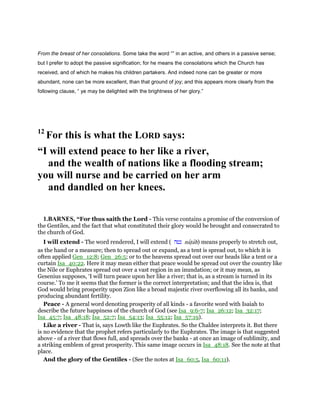


![carried on her sides, under her arms, as little children are, and shall be dangled upon her knees,
as darlings are, especially when they are weary and out of humour, and must be got to sleep.
Those that are joined to the church must be treated thus affectionately. The great Shepherd
gathers the lambs in his arms and carries them in his bosom, and so must the under-
shepherds, that they may not be discouraged. Proselytes should be favourites. (2.) God will
himself be their powerful comforter: As one whom his mother comforts, when he is sick or sore,
or upon any account in sorrow, so will I comfort you; not only with the rational arguments
which a prudent father uses, but with the tender affections and compassions of a loving mother,
that bemoans her afflicted child when it has fallen and hurt itself, that she may quiet it and make
it easy, or endeavours to pacify it after she has chidden it and fallen out with it (Jer_31:20):
Since I spoke against him, my bowels are troubled for him; he is a dear son, he is a pleasant
child. Thus the mother comforts. Thus you shall be comforted in Jerusalem, in the favours
bestowed on the church, which you shall partake of, and in the thanksgivings offered by the
church, which you shall concur with. (3.) They shall feel the blessed effects of this comfort in
their own souls (Isa_66:13): When you see this, what a happy state the church is restored to, not
only your tongues and your countenances, but your hearts shall rejoice. This was fulfilled in the
wonderful satisfaction which Christ's disciples had in the success of their ministry. Christ, with
an eye to that, tells them (Joh_16:22), Your heart shall rejoice and your joy no man taketh
from you. Then your bones, that were dried and withered (the marrow of them quite
exhausted), shall recover a youthful strength and vigour and shall flourish like a herb. Divine
comforts reach the inward man; they are marrow and moistening to the bones, Pro_3:8. The
bones are the strength of the body; those shall be made to flourish with these comforts. The joy
of the Lord will be your strength, Neh_8:10.
5. JAMISON, “extend — I will turn peace (prosperity) upon her, like a river turned in its
course [Gesenius]. Or, “I will spread peace over her as an overflowing river” [Barnes],
(Isa_48:18).
flowing stream — as the Nile by its overflow fertilizes the whole of Egypt.
borne upon ... sides — (See on Isa_60:4).
her ... her — If “ye” refers to the Jews, translate, “ye shall be borne upon their sides ... their
knees,” namely, those of the Gentiles, as in Isa_49:22; and as “suck” (Isa_60:16) refers to the
Jews sucking the Gentile wealth. However, English Version gives a good sense: The Jews, and
all who love Jehovah (Isa_66:10), “shall suck, and be borne” by her as a mother.
6. K&D, “The reason is now given, why the church of the future promises such abundant
enjoyment to those who have suffered with her. “For thus saith Jehovah, Behold, I guide peace
to her like a river, and the glory of the Gentiles like an overflowing stream, that ye may suck;
ye shall be borne upon arms, and fondled upon knees.” Jehovah guides or turns (Gen_39:21)
peace to Jerusalem, the greatest of all inward blessings, and at the same time the most glorious
of all the outward blessings, that are in the possession of the Gentile world (kabhod as in
Isa_56:6), both of them in the richest superabundance (“like a river,” as in Isa_48:18), so that
(perf. cons.) “ye may be able to suck yourselves full according to your heart's desire”
(Isa_60:16). The figure of the new maternity of Zion, and of her children as quasimodogeniti, is
still preserved. The members of the church can then revel in peace and wealth, like a child at its
mother's breasts. The world is now altogether in the possession of the church, because the](https://image.slidesharecdn.com/isaiah66commentary-150114082304-conversion-gate01/85/Isaiah-66-commentary-77-320.jpg)






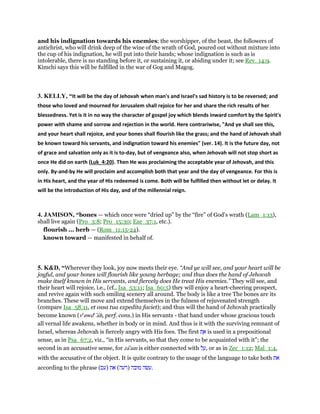
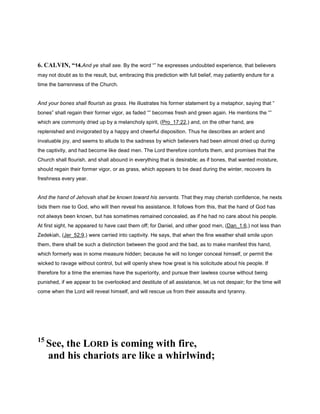


![4. HENRY, “These verses, like the pillar of cloud and fire, have a dark side towards the enemies
of God's kingdom and all that are rebels against his crown, and a bright side towards his faithful
loyal subjects. Probably they refer to the Jews in captivity in Babylon, of whom some are said to
have been sent thither for their hurt, and with them God here threatens to proceed in his
controversy; they hated to be reformed, and therefore should be ruined by the calamity
(Jer_24:9); others were sent thither for their good, and they should have the trouble sanctified
to them, should in due time get well through it and see many a good day after it. Many of the
expressions here used are accommodated to that glorious dispensation; but doubtless the
prophecy looks further, to the judgment for which Christ did come once, and will come again,
into this world, and to the distinction which his word in both makes between the precious and
the vile.
5. JAMISON, “(Isa_9:5; Psa_50:3; Hab_3:5; 2Th_1:8; 2Pe_3:7).
chariots ... whirlwind — (Jer_4:13).
render — as the Hebrew elsewhere (Job_9:13; Psa_78:38) means to “allay” or “stay wrath.”
Maurer translates it so here: He stays His anger with nothing but fury,” etc.; nothing short of
pouring out all His fiery fury will satisfy His wrath.
fury — “burning heat” [Lowth], to which the parallel, “flames of fire,” answers.
6. K&D, “The prophecy now takes a new turn with the thought expressed in the words, “and
fiercely does He treat His enemies.” The judgment of wrath, which prepares the way for the
redemption and ensures its continuance, is described more minutely in Isa_66:15 : “For behold
Jehovah, in the fire will He come, and His chariots are like the whirlwind, to pay out His
wrath in burning heat, and His threatening passeth into flames of fire.” Jehovah comes ba'esh,
in igne (Jerome; the lxx, on the contrary, render it arbitrarily ᆞς πሞρ ka'esh), since it is the fiery
side of His glory, in which He appears, and fire pours from Him, which is primarily the intense
excitement of the powers of destruction within God Himself (Isa_10:17; Isa_30:27; Psa_18:9),
and in these is transformed into cosmical powers of destruction (Isa_29:6; Isa_30:30;
Psa_18:13). He is compared to a warrior, driving along upon war-chariots resembling stormy
wind, which force everything out of their way, and crush to pieces whatever comes under their
wheels. The plural יו ָּתב ְⅴ ְר ַמ (His chariots) is probably not merely amplifying, but a strict plural;
for Jehovah, the One, can manifest Himself in love or wrath in different places at the same time.
The very same substantive clause מרכבתיו וכסופה occurs in Jer_4:13, where it is not used of
Jehovah, however, but of the Chaldeans. Observe also that Jeremiah there proceeds
immediately with a derivative passage from Hab_1:8. In the following clause denoting the
object, וֹ ፍ ה ָמ ֵח ְ יב ִשׁ ָה ְ,ל we must not adopt the rendering, “to breathe out His wrath in burning
heat” (Hitzig), for heshı̄bh may mean respirare, but not exspirare (if this were the meaning, it
would be better to read יב ִ ַה ְל from ב ַשָׁ,נ as Lowth does); nor “ut iram suam furore sedet”
(Meier), for even in Job_9:13; Psa_78:38, עפו השיב does not mean to still or cool His wrath, but](https://image.slidesharecdn.com/isaiah66commentary-150114082304-conversion-gate01/85/Isaiah-66-commentary-88-320.jpg)


![1.BARNES, “For by fire and by his sword - The sword is an instrument by which
punishment is executed (see the notes at Isa_34:5; compare Rom_13:4).
Will he plead with all flesh - Or rather, he will judge (נשׁפט nı she
phatʖ), that is, he will
execute his purposes of vengeance on all the human race. Of course, only that part is intended
who ought to be subject to punishment; that is, all his foes.
And the slain of the Lord shall be many - The number of those who shall be consigned
to woe shall be immense - though in the winding up of the great drama at the close of the world,
there is reason to hopethat a large proportion of the race, taken as a whole, will be saved. Of past
generations, indeed, there is no just ground of such hope; of the present generation there is no
such prospect. But brighter and happier times are to come. The true religion is to spread over all
the world, and for a long period is to prevail; and the hope is, that during that long period the
multitude of true converts will be so great as to leave the whole number who are lost, compared
with those who are saved, much less than is commonly supposed. Still the aggregate of those
who are lost, ‘the slain of the Lord,’ will be vast. This description I regard as having reference to
the coming of the Lord to judgment (compare 2Th_1:8); or if it refer to any other manifestation
of Yahweh for judgment, like the destruction of Jerusalem by the Romans, it has a strong
resemblance to the final judgment; and, like the description of that by the Saviour Matt. 24, the
language is such as naturally to suggest, and to be applicable to, the final judgment of mankind.
2. KELLY, “"For, behold, Jehovah will come with fire, and his chariots like a whirlwind, to render
his anger with fury, and his rebuke with flames of fire. For by fire and by his sword will Jehovah plead
with all flesh: and the slain of Jehovah shall be many. They that sanctify themselves, and purify
themselves in the gardens behind one in the midst, eating swine's flesh and the abomination and the
mouse, shall perish together, saith Jehovah. And I [know] their works and their thoughts: it cometh,
that I will gather all nations and tongues; and they shall come, and see my glory. And I will set a sign
among them, and I will send those that escape of them unto the nations, [to] Tarshish, Pul, and Lud,
that draw the bow, [to] Tubal, and Javan, [to] the isles afar off, that have not heard my fame, neither
have seen my glory; and they shall declare my glory among the nations. And they shall bring all your
brethren [for] an offering unto Jehovah out of all the nations upon horses and in chariots, and in
covered wagons, and upon mules, and upon dromedaries, to my holy mountain, to Jerusalem, saith
Jehovah, as the children of Israel bring an offering in a clean vessel into the house of Jehovah. And of
them also will I take for priests, for Levites, saith Jehovah" (vv.15-21). The efforts of ancient and
modern commentators to apply this passage, like the rest, to gospel times are desperate but vain.
How unequivocally is it a day of judgement, not the glad tidings of salvation by His grace, but His
revelation from heaven in flaming fire taking vengeance on them that know not God, and on them
that obey not the gospel! Evidently the Jews in that day will not only set up their ritual again, but be
addicted to heathen abominations. The day of divine recompense shall be when old evils revive and
amalgamate with novel iniquities, that all may come before Jehovah in judgement, and a new era
dawn on both Jew and Gentile over the earth now purged. It will be a question then not of believing](https://image.slidesharecdn.com/isaiah66commentary-150114082304-conversion-gate01/85/Isaiah-66-commentary-91-320.jpg)





![though it may be rather things offered to idols, or blood, are designed. Mice have been eaten, at
least some sort of them, as the dormouse, by some people, particularly the Romans, and counted
delicious food, as Sanctius upon the place, from various authors, has showed; and Bochart (k)
also observes, that there is a kind of field mice, called by the Arabians "jarbuo", which are eaten
by them, and had in great esteem, and is the very word the Arabic interpreter renders this by in
the text. Now, though the ceremonial law is abolished, and all distinction of meats ceased, and
will continue so in the times referred to; yet the description of these unclean people, pretending
to so much sanctity and purity, is taken from such persons who were reckoned impure in the
times the prophet wrote; and may particularly point at such who abstain from meats at certain
times, to be eaten lawfully; and yet are as unclean as those under the law were, who ate things
forbidden; they being such who are abominable, and make an abomination, and a lie, Rev_21:8,
"these shall be consumed together, saith the Lord"; in the above mentioned battles, or in the
lake which burns with fire and brimstone.
4. HENRY, “Christ will appear to the confusion and terror of all those that stand it out
against him. Sometimes he will appear in temporal judgments. The Jews that persisted in
infidelity were cut off by fire and by his sword. The ruin was very extensive; the Lord then
pleaded with all flesh; and, it being his sword with which they are cut off, they are called his
slain, sacrificed to his justice, and they shall be many. In the great day the wrath of God will be
his fire and sword, with which he will cut off and consume all the impenitent; and his word,
when it takes hold of sinners' consciences, burns like fire, and is sharper than any two-edged
sword. Idolaters will especially be contended with in the day of wrath, Isa_66:17. Perhaps some
of those who returned out of Babylon retained such instances of idolatry and superstition as are
here mentioned, had their idols in their gardens (not daring to set them up publicly in the high
places) and there purified themselves (as the worshippers of the true God used to do) when they
went about their idolatrous rites, one after another, or, as we read it, behind one tree in the
midst, behind Ahad or Ehad, some idol that they worshipped by that name and in honour of
which they ate swine's flesh (which was expressly forbidden by the law of God), and other
abominations, as the mouse, or some other like animal. But the prophecy may refer to all those
judgments which the wrath of God, according to the word of God, will bring upon provoking
sinners, that live in contempt of God and are devoted to the world and the flesh: They shall be
consumed together. From the happiness of heaven we find expressly excluded all idolaters, and
whosoever worketh abomination, Rev_21:27; Rev_22:15. In the day of vengeance secret
wickedness will be brought to light and brought to the account; for (Isa_66:18), I know their
works and their thoughts. God knows both what men do and from what principle and with what
design they do it; and therefore is fit to judge the world, because he can judge the secrets of men,
Rom_2:16.
5. JAMISON, “in ... gardens — Hebrew and the Septuagint rather require, “for (entering
into) gardens,” namely, to sacrifice there [Maurer].
behind one tree — rather, “following one,” that is, some idol or other, which, from
contempt, he does not name [Maurer]. Vitringa, etc., think the Hebrew for “one,” Ahhadh, to be
the name of the god; called Adad (meaning One) in Syria (compare Act_17:23). The idol’s power
was represented by inclined rays, as of the sun shining on the earth. Gesenius translates,
“following one,” namely, Hierophant (“priest”), who led the rest in performing the sacred rites.
in ... midst — namely, of the garden (see on Isa_65:3, Isa_65:4).](https://image.slidesharecdn.com/isaiah66commentary-150114082304-conversion-gate01/85/Isaiah-66-commentary-97-320.jpg)
![mouse — legally unclean (Lev_11:29) because it was an idol to the heathen (see on
Isa_37:36; 1Sa_6:4). Translate, “the field mouse,” or “dormouse” [Bochart]. The Pharisees with
their self-righteous purifications, and all mere formalists, are included in the same
condemnation, described in language taken from the idolatries prevalent in Isaiah’s times.
6. K&D, “The judgment predicted here is a judgment upon nations, and falls not only upon
the heathen, but upon the great mass of Israel, who have fallen away from their election of grace
and become like the heathen. “They that consecrate themselves and purify themselves for the
gardens behind one in the midst, who eat swine's flesh and abomination and the field-mouse-
they will come to an end together, saith Jehovah.” The persons are first of all described; and
then follows the judgment pronounced, as the predicate of the sentence. They subject
themselves to the heathen rites of lustration, and that with truly bigoted thoroughness, as is
clearly implied by the combination of the two synonyms hammithqadde
shı̄m and hammittaharı̄m
(hithpael with an assimilated tav), which, like the Arabic qadusa and tahura, are both traceable to
the radical idea ᅊφορίζειν. The ל ֶא of ֶ־לא ַהַ תוֹ is to be understood as relating to the object or
behoof: their intention being directed to the gardens as places of worship (Isa_1:29; Isa_65:3),
ad sacra in lucis obeunda, as Shelling correctly explains. In the chethib ֶו ָ ְַך אחד ר ַחፍ, the ד ָח ֶא (for
which we may also read ד ַחፍ, the form of connection, although the two pathachs of the text
belong to the keri) is in all probability the hierophant, who leads the people in the performances
of the rites of religious worship and as he is represented as standing in the midst ( ֶו ָ ְַך ) of the
worshipping crowd that surrounds him, 'achar (behind, after) cannot be understood locally, as if
they formed his train or tail, but temporally or in the way of imitation. He who stands in their
midst performs the ceremonies before them, and they follow him, i.e., perform them after him.
This explanation leaves nothing to be desired. The keri, 'achath, is based upon the assumption
that 'achad must refer to the idol, and substitutes therefore the feminine, no doubt with an
allusion to 'asherah, so that battavekh (in the midst) is to be taken as referring not to the midst of
the worshipping congregation, but to the midst of the gardens. This would be quite as suitable;
for even if it were not expressly stated, we should have to assume that the sacred tree of Astarte,
or her statue, occupied the post of honour in the midst of the garden, and 'achar would
correspond to the phrase in the Pentateuch, ים ִר ֵחፍ ים ִּהל ֱא י ֵר ֲחፍ הָנָ.ז But the foregoing expression,
sanctificantes et mundantes se (consecrating and purifying), does not favour this sense of the
word 'achar (why not ל = בוֹד ְכ ִ,)?ל nor do we see why the name of the goddess should be
suppressed, or why she should be simply hinted at in the word ת ַחፍ (one). ד ָח ֶא (ד ַחፍ) has its
sufficient explanation in the antithesis between the one choir-leader and the many followers; but
if we take 'achath as referring to the goddess, we can find no intelligible reason or object.
Some again have taken both 'achad and 'achath to be the proper name of the idol. Ever since
the time of Scaliger and Groitus, 'achad has been associated with the Phoenician ʆ́Αδωδος βασιλεᆷ
ς θεራν mentioned by Sanchuniathon in Euseb. praep. ev. 1, 10, 21, or with the Assyrian sun-god
Adad, of whom Macrobius says (Saturn. 1, 23), Ejus nominis interpretatio significat unus; but](https://image.slidesharecdn.com/isaiah66commentary-150114082304-conversion-gate01/85/Isaiah-66-commentary-98-320.jpg)
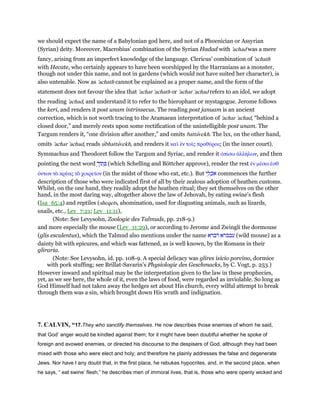
![grossly licentious. Hypocrites sanctified themselves, that is, assumed false disguises of holiness, and
deceived many under this pretense.
They purified themselves in the gardens; that is, they polluted themselves with various superstitions,
although they imagined that, by means of those superstitions, they rendered themselves pure in the sight
of God. Others, without any reserve, despised God and all religion. It is therefore a general statement, in
which he includes all the ungodly, to whatever class they may belong; that is, both those who openly
display their wickedness, and those who hide and cover it by various disguises.
Behind one in the midst. (227) Some commentators supply the word “” or “” as if holy water had been
placed “ the midst” of the garden for ablutions. But another meaning would be equally appropriate; that
every one chose a God for himself exclusively, and therefore every one out of many trees had his own
tree.
(227) “ attaches to it here (as he does in 2Sa_4:6) the sense of the interior or court of an oriental house,
and applies it to the edifice in which the lustrations were performed before entering the gardens; which
may also be the meaning of the Septuagint version, εἰς τοὺς κήπους ἐν τοῖς προθύροις. Maurer and
others follow Scaliger, who makes it mean the midst of the grove or garden, where the idol was commonly
erected. But Knobel, by ingeniously combining Gen_42:5; Psa_42:5; Psa_68:26, makes it not improbable
that “ the midst,” means in the crowd or procession of worshippers.” —Alexander.
18
“And I, because of what they have planned and
done, am about to come[a]
and gather the people of all
nations and languages, and they will come and see my
glory.
1.BARNES, “For I know their works - The word ‘know,’ says Lowth, is here evidently left
out of the Hebrew text, leaving the sense quite imperfect. It is found in the Syriac; the Chaldee
evidently had that word in the copy of the Hebrew which was used; and the Aldine and
Complutensian editions of the Septuagint have the word. Its insertion is necessary in order to](https://image.slidesharecdn.com/isaiah66commentary-150114082304-conversion-gate01/85/Isaiah-66-commentary-100-320.jpg)

![them, Rev_2:18 or, "as for me (l), their works and their thoughts"; as I know them, and abhor
them, I will take vengeance on them for them, for what they have devised and done against me
and mine: "and it shall come"; that is, it shall come to pass, or the time shall come:
that I will gather all nations and tongues; not against Jerusalem in the war of Gog and
Magog, as the Jewish commentators, Aben Ezra, Jarchi, and Kimchi, interpret it, illustrating it
by Zec_14:2 but to Christ and his church, by the preaching of the Gospel; which in the latter day
will be published to every nation, kindred, tongue, and people, and that immediately upon the
destruction of both the western and eastern antichrists; and particularly, by the means of the
latter, way will be made for it into the kingdoms of the east, which thereby will become the
kingdoms of our Lord and of his Christ, Rev_14:6,
and they shall come and see my glory; the glory of Christ's person, offices, and grace; the
glory of his Gospel, worship, and ordinances; the glory that will be upon Zion the church, and on
all which there will be a defence, and a glorious sight it will be; see Isa_4:5.
4. HENRY, “. He will appear to the comfort and joy of all that are faithful to him in the setting
up of his kingdom in this world, the kingdom of grace, the earnest and first-fruits of the
kingdom of glory. The time shall come that he will gather all nations and tongues to himself,
that they may come and see his glory as it shines in the face of Jesus Christ, Isa_66:18. This was
fulfilled when all nations were to be discipled and the gift of tongues was bestowed in order
thereunto. The church had hitherto been confined to one nation and in one tongue only God was
worshipped; but in the days of the Messiah the partition-wall should be taken down, and those
that had been strangers to God should be brought acquainted with him and should see his glory
in the gospel, as the Jews had seen it in the sanctuary. As to this, it is here promised,
5. JAMISON, “know — not in the Hebrew. Rather, understand the words by aposiopesis; it
is usual in threats to leave the persons threatened to supply the hiatus from their own fears,
owing to conscious guilt: “For I ... their works and thoughts,” etc.; namely, will punish [Maurer].
it shall come — the time is come that I will, etc. [Maurer].
gather ... nations — against Jerusalem, where the ungodly Jews shall perish; and then the
Lord at last shall fight for Jerusalem against those nations: and the survivors (Isa_66:19) shall
“see God’s glory” (Zec_12:8, Zec_12:9; Zec_14:1-3, Zec_14:9).
tongues — which have been many owing to sin, being confounded at Babel, but which shall
again be one in Christ (Dan_7:14; Zep_3:9; Rev_7:9, Rev_7:10).
6. K&D, “The prophecy now marks out clearly the way which the history of Israel will take. It
is the same as that set forth by Paul, the prophetic apostle, in Rom 9-11 as the winding but
memorable path by which the compassion of God will reach its all-embracing end. A universal
judgment is the turning-point. “And I, their works and their thoughts - it comes to pass that all
nations and tongues are gathered together, that they come and see my glory.” This v.
commences in any case with a harsh ellipsis. Hofmann, who regards Isa_66:17 as referring not
to idolatrous Israelites, but to the idolatrous world outside Israel, tries to meet the difficulty by](https://image.slidesharecdn.com/isaiah66commentary-150114082304-conversion-gate01/85/Isaiah-66-commentary-102-320.jpg)

![II. THE MEANS BY WHICH IT SHALL BE ACCOMPLISHED.
III. THE EXTENT TO WHICH IT SHALL REACH.
IV. THE HOLY AND BLESSED EFFECTS WHICH SHALL BE PRODUCED BY IT. (J.
Snodgrass, D. D.)
The Gospel to be preached to the uncivilized
No regard seems here to be paid to that favourite maxim with many, that the Gospel can only be
successfully preached to a people already in a civilized state. It is certain that the first preaching
of the Gospel to the nations of the world was not conducted upon any such narrow principle. On
the contrary, it is mentioned by some of the early apologists for Christianity, as one of its
honourable achievements, that it has turned even the most cruel and barbarous people into
mildness and docility. If any intimation is given, in prophecy, upon this point, it seems rather to
reverse the above-mentioned maxim. Were Pul and Lud, and Tubal and Tarshish, civilized
countries in the days of this prophet T yet God is represented as sending messengers to them, to
declare His glory among the Gentiles. Is there a more unfavourable manner of life for receiving
instruction than that of a people wandering about, without any fixed residence? or is there any
state of society more base than that of men living in eaves and rocks of the earth? yet the glad
tidings of the Gospel will make the villages, or clustered tents, of Kedar to rejoice, and the
inhabitants of the rock to sing. (J. Snodgrass, D. D.)
8. CHARLES SIMEON, “THE JEWS TO CONVERT THE GENTILES
Isa_66:18-24. It shall come, that I will gather all nations and longues; and they shall come, and see my
glory. And I will set a sign among them; and I will send those that escape of them unto the nations, to
Tarshish, Pul, and Lud, that draw the bow, to Tubal and Javan, to the isles afar off, that have not heard
my fame, neither have seen my glory; and they shall declare my glory among the Gentiles. And then shall
bring all your brethren for an offering unto the Lord, out of all nations, upon horses, and in chariots, and in
litters, and upon mules, and upon swift beasts, to my holy mountain Jerusalem, saith the Lord, at the
children of Israel bring an offering in a clean ressel into the House of the Lord.
WHEN we look upon the world around us, and consider how utterly God is neglected and despised by the
great mass of his intelligent creatures, and that successive generations of immortal beings are swept
away without any knowledge of a Saviour, or any hope of beholding the face of God in peace, we are
ready to say with the prophet, “Oh that my head were waters, and mine eyes a fountain of tears, that I
might weep night and day [Note: Jer_9:1.],” for the dishonour done to my God, and for the miseries which,
like a relentless deluge, are overwhelming the whole earth! It is however a consolation to know, that this
state of things is drawing to a close, and that a new era is about to appear, when the darkness which now
covers the earth shall be dispelled, and righteousness reign, where sin hath hitherto maintained an
undisputed sway. The prospect of this period, which is now fast approaching, and speedily to commence,](https://image.slidesharecdn.com/isaiah66commentary-150114082304-conversion-gate01/85/Isaiah-66-commentary-104-320.jpg)
![was the great support of the Church under the distresses to which she was reduced in the Babylonish
captivity; and it still forms the richest source of consolation to all who have any zeal for God, or any
concern for the welfare of mankind. So impressed was the prophet Isaiah with his views of this mighty
change, that he could scarcely speak of any thing else: or, if he did speak of the restoration of the Jews
from Babylon, or of the blessings treasured up for them by the introduction of the Messiah’s kingdom, he
constantly interwove in his statements such grand and glorious expressions, as could not fail of carrying
forward the minds of his readers to this blessed time, when “new heavens and a new earth were to be
created [Note: ver. 22.],” and the universal empire of righteousness to be established throughout the
earth. Of this period he speaks in the words before us; which will lead me to set before you,
I. God’s purpose respecting the Gentile world—
“It shall come to pass, that I will gather all nations and tongues; and they shall come, and see my glory.”
This is the fixed purpose of Jehovah; a purpose,
1. Proclaimed by all the prophets—
[Respecting “the gathering of the nation” to Christ, there is but one voice, from the time of Abraham to the
close of the sacred canon. Christ is that “Seed in whom all the nations of the earth are to be blessed
[Note: Gen_18:18.];” that “Shiloh, to whom the gathering of all people shall be [Note: Gen_49:10.].” “The
utmost ends of the earth are promised to Him for his possession [Note: Psa_2:8.]:” “all kings shall fall
down before him, all nations shall do him service [Note: Psa_72:11.]:” “from the rising of the sun unto the
going down thereof shall his name be great among the Gentiles [Note: Mal_1:11.];” and all the kingdoms
of the world shall become the kingdom of our Lord and of his Christ [Note: Rev_11:15.].”
But there is a peculiarity in this prophecy which must not be overlooked. God has in the great work of
redemption revealed his glory to mankind. In that he he shewn how “mercy and truth could meet together,
and righteousness and peace could kiss each other [Note: Psa_85:10.].” There he has proclaimed his
name as “merciful and gracious, and yet as not by any means clearing the guilty [Note:Exo_34:6-7.].” It is
this harmony of his perfections that chiefly constitutes his glory. Previous to the revelation of his Gospel,
the highest archangel could not have conceived how God could be “a just God, and yet a Saviour
[Note: Isa_45:21.].” But in Christ Jesus the whole difficulty is solved. By sending him into the world, and
laying our iniquities on him, the fullest demands of justice are satisfied, and a way is opened for the
richest exercise of mercy towards a guilty world: the truth of God which was pledged for the execution of
all his threatening, is preserved; and yet may the sinner, who was obnoxious to them, be absolved, and
be restored to the enjoyment of his forfeited inheritance. This is the mystery in which all the glory of the](https://image.slidesharecdn.com/isaiah66commentary-150114082304-conversion-gate01/85/Isaiah-66-commentary-105-320.jpg)
![Godhead shines; and which all the nations of the earth shall in due time have revealed to them in its
meridian splendour. This is fully declared by the prophet in a preceding chapter: “Arise, shine! for thy light
is come; and the glory of the Lord is risen upon thee. For, behold, the darkness shall cover the earth, and
gross darkness the people: but the Lord shall arise upon thee, and his glory shall be seen upon thee. And
the Gentiles shall come to thy light, and kings to the brightness of thy rising [Note: Isa_60:1-3; Isa_62:2.].”
And the prophet Habakkuk also marks it with peculiar precision: “The earth,” says he, “shall be filled
with the knowledge of the glory of the Lord, as the waters cover the sea.”]
2. Assuredly to be fulfilled in its season—
[Were we to judge by present appearances, we should say, that such an event could never be
accomplished. But so we should have thought respecting the deliverance of the Jews from Egypt, and
from Babylon; and of the establishment of Christianity by the ministry of a few poor fishermen. But it is not
in this way that we are to form our judgment or our expectations. We have only to ask ourselves; “Has
God promised these things? and, Is he able to perform them?” These points being ascertained, we are as
sure of the event, as if we already saw it before our eyes: for “God is not a man that he should lie, or a
son of man, that he should repent.” In fact, the prophet did, as it were, behold it actually accomplishing in
his day: he saw the Gentile world “flying to Christ, as doves to their windows;” and he called upon the
Church to rejoice in it: “Break forth into joy; sing together, ye waste places of Jerusalem: for the Lord hath
comforted his people; he hath redeemed Jerusalem: the Lord hath made bare his holy arm in the eyes of
all the nations: and all the ends of the earth shall see the salvation of our God [Note: Isa_52:9-10. with
60:4, 8.].”]
If the purpose itself fill us with wonder, we shall be no less amazed when we are informed of,
II. The instruments by whom he will effect it—
It was by the ministry of Jews that God was pleased to bring in the first fruits of the Gentiles; and by the
ministry of the Jews will he gather in the whole harvest. In this passage the prophet distinctly states who
are,
1. The persons ordained to this work—
[They are here designated as “those who have escaped unto the nations:” and who these are there can
be no doubt. They are the remnant of the Jewish nation dispersed throughout the world [Note:
SeeIsa_4:2.]. What the particular places are amongst which they are scattered, it is not necessary to](https://image.slidesharecdn.com/isaiah66commentary-150114082304-conversion-gate01/85/Isaiah-66-commentary-106-320.jpg)
![determine: it is sufficient to know, that they are countries widely distant from each other, and countries
“which have not heard of the Redeemer’s fame, or seen his glory.” Amongst these nations shall “an
ensign be raised” by the Jews, whom “God has sent to them” for this express purpose: and it is by their
ministry that God will diffuse the knowledge of salvation amongst them. The language here used is clear
and decisive: “I will send those that escape of them,” that is, the Jews; “I will send them unto the
nations; and they shall declare my glory among the Gentiles.” How little has the Christian world adverted
to this prophecy! How little have any of us, when perhaps we have been pouring contempt upon the
Jews, recollected for what glorious purposes they are reserved, and what a blessing they are ordained to
be to the whole world! Be it known unto you, Brethren, that the jews are the persons ordained of God to
“declare his glory among the Gentiles.” They themselves are at present as unconscious of the end for
which they are so dispersed, as the Gentiles are amongst whom they are scattered: but they shall
nevertheless infallibly execute the office for which they are designed. The prophet Micah says of them,
“The remnant of Jacob shall be in the midst of many people as a dew from the Lord, as the showers upon
the grass, that tarrieth not for man, nor waiteth for the sons of men [Note: Mic_5:7.].” Now the clouds
know not the end for which God sends them over the face of the earth; nor is the dew aware of the
purpose which God has designed it to effect: but both the one and the other infallibly and effectually
execute the purposes of heaven, and cause the parched ground to send forth its fruits. So shall the Jews
do, when once the light has burst in upon their minds; and “the receiving of them into the Christian
Church shall be as life from the dead” to the whole world [Note: Rom_11:15.].]
2. The success that shall attend their labours—
[As the effects of rain are rapid on the whole vegetable creation, so shall the fruits of their ministry among
the Gentiles be rapid and abundant; “They shall bring all their Gentile brethren for an offering unto the
Lord, out of all nations, saith the Lord; as the children of Israel bring an offering in a clean vessel into the
house of the Lord.” The meat-offering consisted of fine flour unleavened, and mingled with oil: oil also
was poured upon it, and frankincense put thereon [Note: Lev_2:1-6.]. Of how many myriads of particles
an handful of flour consisted, we know not: but it very fitly represents the congregated masses of
believers that shall then be presented to the Lord, all of them pure and unleavened, and all of them
sanctified by the Holy Ghost. This is the very construction which St. Paul himself puts upon the text, which
he represents as in part fulfilled in himself, who was, in a more peculiar manner than any other of the
Apostles, “the minister of Jesus Christ to the Gentiles, ministering the Gospel of God, that the offering up
of the Gentiles might be acceptable, being sanctified by the Holy Ghost [Note: Rom_15:16.].” Nor let it be
thought that this is a fanciful interpretation: for the prophet himself, in a foregoing chapter, represents the
converts as “a cloud [Note: Isa_60:8.],” which, whether it be understood of dust, or of rain, conveys
precisely the same idea as we have just suggested from the meat-offering: and the Psalmist also places](https://image.slidesharecdn.com/isaiah66commentary-150114082304-conversion-gate01/85/Isaiah-66-commentary-107-320.jpg)
![the matter in exactly the same view, when he says, that “the handful of corn cast by them upon the tops
of the mountains shall grow up as the woods of Lebanon, and as the piles of grass upon the earth
[Note: Psa_72:16.].” Indeed the prophet himself uses in another place a still stronger figure: for he
represents the Gentile world at that period as “flowing (contrary to nature), like a mighty river, up to the
Lord’s House, when established upon the top of the highest mountains [Note: Isa_2:2.];” so powerful, so
harmonious, so universal shall be the concourse of the Gentiles to Mount Zion, in consequence of God’s
blessing on the labours of their Jewish instructors.]
See then,
1. Of what importance the conversion of the Jews is to the whole world!
[Many individuals may be, and are, converted from among the Gentiles by the labours of Gentile
teachers; and we do well to exert ourselves in every possible way for the diffusion of Christian knowledge
amongst them. But though we may reap the first-fruits, the gathering in of the harvest is reserved for
labourers of the Jewish community. There is a passage which is supposed to establish a directly opposite
opinion: but the passage itself is quite misunderstood. It is said, that “blindness in part is happened to
Israel, until the fulness of the Gentiles be come in [Note: Rom_11:25.]:” and from thence it is supposed,
that the whole of the Gentiles must be converted, before that blindness is removed from the Jewish
people. But in another part of the same chapter it is said, that, as the diminishing of the Jews was the
means of enriching the Gentile world, much more shall their fulness be so; the receiving of the Jews into
the Church being the signal for, and the means of, a spiritual resurrection to the whole Gentile world
[Note: Rom_11:12; Rom_11:15.]. The “fulness” in both places imports, not the complete ingathering of all,
but the commencement of that mighty work. It will begin among the Gentiles (as it has indeed already
begun); and then it will proceed among the Jews, who shall carry it on, and perfect it, among the
Gentiles. As soon as the Jews determinately rejected the Gospel, it was preached unto the Gentiles
[Note: Act_13:45-47.]: and as soon as the Gentiles begin in any considerable numbers to embrace the
faith of Christ, we hope and believe, that God will make known himself unto the Jews, and make them the
instruments of converting the whole world. If then we have any concern for the Gentile world, we should
labour with all our might (in prayer, and in the use of all suitable means) to impart the Gospel to the Jews;
that so they may be ready to execute the work to which they are ordained, and for which they are fitted
beyond any other people upon the face of the earth. As having their own Scriptures (upon which ours are
founded) with them, and as understanding the languages of the different countries wherein they dwell,
they are ready at any moment to preach the Gospel to those around them, as soon as ever “the veil shall
be taken from their own hearts.” Being acquainted with their own Scriptures, they will unlock the mysteries
contained in ours, the very instant that “the key of knowledge” is put into their hands. And their conversion](https://image.slidesharecdn.com/isaiah66commentary-150114082304-conversion-gate01/85/Isaiah-66-commentary-108-320.jpg)
![will itself be such a confirmation of prophecy, that all will be ready to receive their word, and to obey the
Gospel delivered by them. Let us therefore arise to our long-neglected duty; and “neither rest ourselves,
nor give rest unto our God,” till he call in his banished children, and make Jerusalem once more a praise
in the earth [Note: Isa_62:6-7.].]
2. What are those points to which we must particularly attend in our own conversion—
[The Jews are to “declare God’s glory among the Gentiles,” and to “offer them up as an holy offering unto
the Lord.” These are the two essential points of conversion; and if either be wanting in us, we can never
behold the face of God in peace. We must have light in our understandings, and holiness in our hearts.
The first thing in the old creation was light; and that also is the first in the new: “God, who created light out
of darkness, must shine into our hearts, to give us the light of the knowledge of the glory of God in the
face of Jesus Christ [Note: 2Co_4:6.].” This is not a mere speculative knowledge; but such a view of
God’s glory, as leads immediately to a willing surrender of our souls to him, “as a living sacrifice
[Note: Rom_12:1. 2Co_8:5.].” The two must go together, as the root and the fruit. They are absolutely
inseparable. We never can devote ourselves unreservedly to God, till we feel our obligations to him for all
the wonders of redeeming love: but if once we have right views of Christ, “we shall immediately purify
ourselves, even as he is pure [Note: 1Jn_3:3.].” Let us then never be satisfied, till “Christ is fully revealed
in our hearts [Note: Gal_1:16.],” and till we so “behold his glory as to be changed by it into the same
image from glory to glory, even as by the Spirit of the Lord [Note: 2Co_3:18.].”]
9. CALVIN, “18.For I —their works, and their thoughts. (228) He confirms what he said in the preceding
verse; namely, that punishment shall be executed on all the ungodly, in order that, although the Lord
permit them for a time to sin with impunity, yet believers, being convinced that they shall one day be
punished, may guard against following their example. The Lord here testifies that he sees and observes
their works, and that one day he will actually manifest that none can be concealed from his eyes. Others
understand by it that the ungodly can accomplish nothing without God’ permission. That statement is
indeed true, but is not applicable to this passage; for everybody sees that it is unnatural, and at variance
with the context of the Prophet, who merely confirms what he formerly said, that hypocrites and wicked
men shall not finally escape with impunity, because God perceives all their actions, and schemes, and
thoughts; and that they gain nothing by their evasions, as if they were never to be dragged to the
judgment.
Because the time is come. These words confirm still more what has been already said, for he says that
the time is at hand when he shall assemble all the nations, that he may cast off the hypocrites and](https://image.slidesharecdn.com/isaiah66commentary-150114082304-conversion-gate01/85/Isaiah-66-commentary-109-320.jpg)
![ungodly, and gather and adopt a people to himself from among them. The Jews were puffed up with
pride, and despised all other nations as unholy. But the Lord declares that he will adopt those nations,
that they may be partakers of his glory, of which the Jews prove themselves to be unworthy.
This is a remarkable passage, which teaches us that God is not confined to any people, so as not to
choose whomsoever he pleases, by casting off unbelievers whom he formerly called to himself. This is
abundantly explained by Paul, (Rom_10:19,) where he shews that we have come into a possession which
was left empty, after the Jews were cast off through their unbelief. Isaiah now threatens them in this
manner. “ not that God is in want of peoples when you have revolted and have rendered yourselves
unworthy of his grace, for he will have others; but he will shew that he is the judge, and will not finally
permit you to abuse so great forbearance.”
And they shall come. He says that “ shall come,” because, being ingrafted by unity of faith, they shall be
united in the Church with the true Jews, who have not swerved from the adoption; for, in consequence of
the Jews being near to God, the Gentiles, who were at a distance, must be joined to them, that, by the
removal of disagreement, they might become one body.
And shall see my glory. To “ the glory” of the Lord, is nothing else than to enjoy that grace which he had
bestowed on the Jews; for the special privilege of that nation was, that they beheld the glory of God, and
had tokens of his presence, he says that now the Gentiles, who had not enjoyed these benefits, shall see
and behold that glory, for the Lord will reveal himself to all without exception.
(228) “Car je voy leurs oeuvres et leurs pensees.” “ I see their works and their thoughts.”
19
“I will set a sign among them, and I will send some
of those who survive to the nations—to Tarshish, to
the Libyans[b]
and Lydians (famous as archers), to
Tubal and Greece, and to the distant islands that have](https://image.slidesharecdn.com/isaiah66commentary-150114082304-conversion-gate01/85/Isaiah-66-commentary-110-320.jpg)


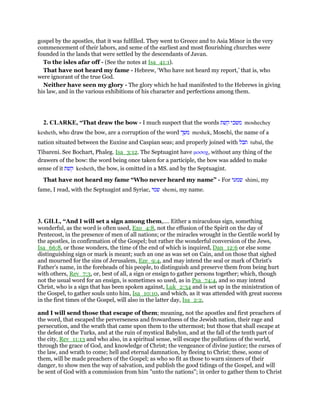
![and his church, and behold his glory: particularly to "Tarshish", a word sometimes used for the
sea; and the Vulgate Latin version renders it "the nations in the sea"; or, as the Targum, the
province of the sea, the maritime provinces, those that lie nearest the sea; the Persian and
Arabian seas; or Tartessus in Spain; and may be put for the whole country:
Pul, and Lud, that draw the bow; which some take to be the same with Put and Lud, or
Lybia and Lydia, which go together, Jer_46:9 both countries in Africa, famous for archery; and
the Vulgate Latin version renders it Africa and Lydia; though Bochart, and after him Vitringa,
take Pul to be the same with Philas, an island upon the Nile, above Syene, between Ethiopia and
Egypt, of which Diodorus Siculus (m) and Strabo (n) make mention; or Elephantine, the same
with Phil, near the other. Kimchi interprets those that draw the bow of the Turks:
to Tubal and Javan; which the same version renders Italy and Greece:
and the isles afar off; even as far as the West Indies: what places and countries are exactly
and precisely meant cannot be determined; only, in general, that into various parts of the world,
east, west, north, and south, even the most distant, the Gospel and Gospel ministers shall be
sent:
even to those that have not heard my fame; or, "my report" (o); the Gospel, which is a
good and true report of Christ; this the nations, covered with gross darkness, the Pagan ones,
have not so much as heard of, but now shall, through these men being sent unto them:
neither have seen my glory; in the glass of the Gospel, that having never been set before
them; and so have never seen the glory of Christ, as the only begotten of the Father; his
comeliness and beauty, the fulness of grace in him, nor any of the excellencies of him, either of
his person or offices:
and they shall declare my glory among the Gentiles; this, those that are escaped, or the
preachers sent to the nations, shall do; they shall declare publicly, plainly, and clearly, that
Christ is the brightness of the divine Glory; shall declare the glory of his deity; of his rich grace
and love to sinners, in suffering and dying for them; of his salvation, how great, complete,
suitable, and glorious it is; with all the glorious truths of the Gospel, peace, pardon,
righteousness, and eternal life, by Christ.
4. HENRY, “That many converts shall hereby be made, Isa_66:20.
(1.) They shall bring all your brethren (for proselytes ought to be owned and embraced as
brethren) for an offering unto the Lord. God's glory shall not be in vain declared to them, but
they shall be both invited and directed to join themselves to the Lord. Those that are sent to
them shall succeed so well in their negotiation that thereupon there shall be as great flocking to
Jerusalem as used to be at the time of a solemn feast, when all the males from all parts of the
country were to attend there, and not to appear empty. Observe, [1.] The conveniences that they
shall be furnished with for their coming. Some shall come upon horses, because they came from
far and the journey was too long to travel on foot, as the Jews usually did to their feasts. Persons
of quality shall come in chariots, and the aged, and sickly, and little children, shall be brought in
litters or covered wagons, and the young men on mules and swift beasts. This intimates their
zeal and forwardness to come. They shall spare no trouble nor charge to get to Jerusalem. Those
that cannot ride on horseback shall come in litters; and in such haste shall they be, and so
impatient of delay, that those that can shall ride upon mules and swift beasts. These expressions
are figurative, and these various means of conveyance are heaped up to intimate (says the](https://image.slidesharecdn.com/isaiah66commentary-150114082304-conversion-gate01/85/Isaiah-66-commentary-114-320.jpg)
![learned Mr. Gataker) the abundant provision of all those gracious helps requisite for the
bringing of God's elect home to Christ. All shall be welcome, and nothing shall be wanting for
their assistance and encouragement. [2.] The character under which they shall be brought. They
shall come, not as formerly they used to come to Jerusalem, to be offerers, but to be themselves
an offering unto the Lord, which must be understood spiritually, of their being presented to God
as living sacrifices, Rom_12:1. The apostle explains this, and perhaps refers to it, Rom_15:16,
where he speaks of his ministering the gospel to the Gentiles, that the offering up, or
sacrificing, of the Gentiles might be acceptable. They shall offer themselves, and those who are
the instruments of their conversion shall offer them, as the spoils which they have taken for
Christ and which are devoted to his service and honour. They shall be brought as the children of
Israel bring an offering in a clean vessel, with great care that they be holy, purified from sin,
and sanctified to God. It is said of the converted Gentiles (Act_15:9) that their hearts were
purified by faith. Whatever was brought to God was brought in a clean vessel, a vessel
appropriated to religious uses. God will be served and honoured in the way that he has
appointed, in the ordinances of his own institution, which are the proper vehicles for these
spiritual offerings. When the soul is offered up to God the body must be a clean vessel for it,
possessed in sanctification and honour, and not in the lusts of uncleanness (1Th_4:4, 1Th_4:5);
and converts to Christ are not only purged from an evil conscience, but have their bodies also
washed with pure water, Heb_10:22. Now,
(2.) This may refer, [1.] To the Jews, devout men, and proselytes out of every nation under
heaven, that flocked together to Jerusalem, expecting the kingdom of the Messiah to appear,
Act_2:5, Act_2:6, Act_2:10. They came from all parts to the holy mountain of Jerusalem, as an
offering to the Lord, and there many of them were brought to the faith of Christ by the gift of
tongues poured out on the apostles. Methinks there is some correspondence between that
history and this prophecy. The eunuch some time after came to worship at Jerusalem in his
chariot and took home with him the knowledge of Christ and his holy religion. [2.] To the
Gentiles, some of all nations, that should be converted to Christ, and so added to his church,
which, though a spiritual accession, is often in prophecy represented by a local motion. The
apostle says of all true Christians that they have come to Mount Zion, and the heavenly
Jerusalem (Heb_12:22), which explains this passage, and shows that the meaning of all this
parade is only that they shall be brought into the church by the grace of God, and in the use of
the means of that grace, as carefully, safely, and comfortably, as if they were carried in chariots
and litters. Thus God shall persuade Japhet and he shall dwell in the tents of Shem, Gen_9:27.
5. JAMISON, “sign — a banner on a high place, to indicate the place of meeting for the
dispersed Jewish exiles, preparatory to their return to their land (Isa_5:26; Isa_11:12;
Isa_62:10).
those that escape of them — the Gentile survivors spared by God (see on Isa_66:18;
Zec_14:16). Isa_2:2, Isa_2:3; Mic_5:7; and Zec_14:16-19 represent it, not that the Jews go as
missionaries to the Gentiles, but that the Gentiles come up to Jerusalem to learn the Lord’s ways
there.
Tarshish — Tartessus in Spain, in the west.
Pul — east and north of Africa: probably the same as Philoe, an island in the Nile, called by
the Egyptians Pilak, that is, the border country, being between Egypt and Ethiopia [Bochart].](https://image.slidesharecdn.com/isaiah66commentary-150114082304-conversion-gate01/85/Isaiah-66-commentary-115-320.jpg)
![Lud — the Libyans of Africa (Gen_10:13), Ludim being son of Mizraim (Egypt): an Ethiopian
people famous as bowmen (Jer_46:9): employed as mercenaries by Tyre and Egypt (Eze_27:10;
Eze_30:5).
Tubal — Tibarenians, in Asia Minor, south of the Caucasus, between the Black Sea and
Araxes. Or, the Iberians [Josephus]. Italy [Jerome].
Javan — the Greeks; called Ionians, including all the descendants of Javan, both in Greece
and in Asia Minor (Gen_10:2-4).
my glory ... Gentiles — (Mal_1:11).
6. K&D 19-20, “But a remnant escapes; and this remnant is employed by Jehovah to
promote the conversion of the Gentile world and the restoration of Israel. “And I set a sign upon
them, and send away those that have escaped from them to the Gentiles to Tarshiish, Phûl, and
Lûd, to the stretchers of the bow, Tûbal and Javan - the distant islands that have not heard my
fame and have not seen my glory, and they will proclaim my glory among the Gentiles. And
they will bring your brethren out of all heathen nations, a sacrifice for Jehovah, upon horses
and upon chariots, and upon litters and upon mules and upon dromedaries, to my holy
mountain, to Jerusalem, saith Jehovah, as the children of Israel bring the meat-offering in a
clear vessel to the house of Jehovah.” The majority of commentators understand ve
samtı̄ bahem
'oth (and I set a sign upon them) as signifying, according to Exo_10:2, that Jehovah will perform
such a miraculous sign upon the assembled nations as He formerly performed upon Egypt
(Hofmann), and one which will outweigh the ten Egyptian 'othoth and complete the destruction
commenced by them. Hitzig supposes the 'oth to refer directly to the horrible wonder connected
with the battle, in which Jehovah fights against them with fire and sword (compare the parallels
so far as the substance is concerned in Joe_3:14-16, Zep_3:8, Eze_38:18., Zec_14:12.). But
since, according to the foregoing threat, the expression “they shall see my glory” signifies that
they will be brought to experience the judicial revelation of the glory of Jehovah, if ve
samtı̄ bahem
'oth (and I set a sign upon them) were to be understood in this judicial sense, it would be more
appropriate for it to precede than to follow. Moreover, this ve
samtı̄ bahem 'oth would be a very
colourless description of what takes place in connection with the assembled army of nations. It
is like a frame without a picture; and consequently Ewald and Umbreit are right in maintaining
that what follows directly after is to be taken as the picture for this framework. The 'oth (or sign)
consists in the unexpected and, with this universal slaughter, the surprising fact, that a remnant
is still spared, and survives this judicial revelation of glory. This marvellous rescue of individuals
out of the mass is made subservient in the midst of judgment to the divine plan of salvation.
those who have escaped are to bring to the far distant heathen world the tidings of Jehovah, the
God who has been manifested in judgment and grace, tidings founded upon their own
experience. It is evident from this, that notwithstanding the expression “all nations and
tongues,” the nations that crowd together against Jerusalem and are overthrown in the attempt,
are not to be understood as embracing all nations without exception, since the prophet is able to
mention the names of many nations which were beyond the circle of these great events, and had
been hitherto quite unaffected by the positive historical revelation, which was concentrated in
Israel. By Tarshish Knobel understand the nation of the Tyrsenes, Tuscans, or Etruscans; but
there is far greater propriety in looking for Tarshish, as the opposite point to 'Ophir, in the
extreme west, where the name of the Spanish colony Tartessus resembles it in sound. In the](https://image.slidesharecdn.com/isaiah66commentary-150114082304-conversion-gate01/85/Isaiah-66-commentary-116-320.jpg)






![expressive of the Gospel ministry, which is the vehicle of salvation, and in which souls are
brought to Christ, and to his church; and various sorts being mentioned, may signify the
multitudes that shall be gathered in, and the different accommodations made, according to
different circumstances; some that are strong and eager, and impatient of church communion,
are brought on more speedily, on horses, and swift beasts; and others more weakly, and can
move but slowly, in chariots and litters; and all denote the safe and honourable way and manner
in which they are conducted, as well as the welcome they may expect to have in the churches of
Christ; since all manner of help is afforded to them. The horse is an emblem of the Gospel
ministry, and so is the chariot, Rev_6:2 the place they will be brought unto is,
to my holy mountain Jerusalem, saith the Lord; not Jerusalem literally taken, though it
is highly probable it will be at this time a place of great resort of all Christians; but the church,
often called by this name in this prophecy, and in this chapter; a "mountain", for height,
visibility, and especially for firmness and immovableness; a "holy" one, where holy things,
words, and ordinances are ministered, holy persons meet, and none else should be members of
it; hither converted persons are brought, to partake of those holy things, and have communion
with holy persons, by means of the ministers of the Gospel, who invite, exhort, encourage, and
persuade, and use the most forcible arguments they can, but after all are but instruments, God is
the cause; it is he that brings souls to Zion, Jer_3:14 the manner follows:
as the children of Israel bring an offering in a clean vessel into the house of the
Lord; just as the "minchah", or meat offering, was brought in a pure and clean vessel into the
sanctuary of the Lord, and there presented before him; as all the vessels there were Holy Ones,
Ezr_8:28 denoting who those should be that should be brought and offered; persons whose
hearts were purified by faith in the blood of Christ; called with a holy calling; sanctified by the
Holy Ghost; and appearing in the beauties of holiness of heart and life. The Septuagint version
renders it, "with psalms"; and the Arabic version, "with a jubilee"; suggesting they should be
brought with joy and gladness; see Psa_45:15. The ancient Jews (p) interpret all this of the gifts
brought to the King Messiah in his days.
4. HENRY, “That many converts shall hereby be made, Isa_66:20.
(1.) They shall bring all your brethren (for proselytes ought to be owned and embraced as
brethren) for an offering unto the Lord. God's glory shall not be in vain declared to them, but
they shall be both invited and directed to join themselves to the Lord. Those that are sent to
them shall succeed so well in their negotiation that thereupon there shall be as great flocking to
Jerusalem as used to be at the time of a solemn feast, when all the males from all parts of the
country were to attend there, and not to appear empty. Observe, [1.] The conveniences that they
shall be furnished with for their coming. Some shall come upon horses, because they came from
far and the journey was too long to travel on foot, as the Jews usually did to their feasts. Persons
of quality shall come in chariots, and the aged, and sickly, and little children, shall be brought in
litters or covered wagons, and the young men on mules and swift beasts. This intimates their
zeal and forwardness to come. They shall spare no trouble nor charge to get to Jerusalem. Those
that cannot ride on horseback shall come in litters; and in such haste shall they be, and so
impatient of delay, that those that can shall ride upon mules and swift beasts. These expressions
are figurative, and these various means of conveyance are heaped up to intimate (says the
learned Mr. Gataker) the abundant provision of all those gracious helps requisite for the
bringing of God's elect home to Christ. All shall be welcome, and nothing shall be wanting for
their assistance and encouragement. [2.] The character under which they shall be brought. They
shall come, not as formerly they used to come to Jerusalem, to be offerers, but to be themselves](https://image.slidesharecdn.com/isaiah66commentary-150114082304-conversion-gate01/85/Isaiah-66-commentary-123-320.jpg)
![an offering unto the Lord, which must be understood spiritually, of their being presented to God
as living sacrifices, Rom_12:1. The apostle explains this, and perhaps refers to it, Rom_15:16,
where he speaks of his ministering the gospel to the Gentiles, that the offering up, or
sacrificing, of the Gentiles might be acceptable. They shall offer themselves, and those who are
the instruments of their conversion shall offer them, as the spoils which they have taken for
Christ and which are devoted to his service and honour. They shall be brought as the children of
Israel bring an offering in a clean vessel, with great care that they be holy, purified from sin,
and sanctified to God. It is said of the converted Gentiles (Act_15:9) that their hearts were
purified by faith. Whatever was brought to God was brought in a clean vessel, a vessel
appropriated to religious uses. God will be served and honoured in the way that he has
appointed, in the ordinances of his own institution, which are the proper vehicles for these
spiritual offerings. When the soul is offered up to God the body must be a clean vessel for it,
possessed in sanctification and honour, and not in the lusts of uncleanness (1Th_4:4, 1Th_4:5);
and converts to Christ are not only purged from an evil conscience, but have their bodies also
washed with pure water, Heb_10:22. Now,
(2.) This may refer, [1.] To the Jews, devout men, and proselytes out of every nation under
heaven, that flocked together to Jerusalem, expecting the kingdom of the Messiah to appear,
Act_2:5, Act_2:6, Act_2:10. They came from all parts to the holy mountain of Jerusalem, as an
offering to the Lord, and there many of them were brought to the faith of Christ by the gift of
tongues poured out on the apostles. Methinks there is some correspondence between that
history and this prophecy. The eunuch some time after came to worship at Jerusalem in his
chariot and took home with him the knowledge of Christ and his holy religion. [2.] To the
Gentiles, some of all nations, that should be converted to Christ, and so added to his church,
which, though a spiritual accession, is often in prophecy represented by a local motion. The
apostle says of all true Christians that they have come to Mount Zion, and the heavenly
Jerusalem (Heb_12:22), which explains this passage, and shows that the meaning of all this
parade is only that they shall be brought into the church by the grace of God, and in the use of
the means of that grace, as carefully, safely, and comfortably, as if they were carried in chariots
and litters. Thus God shall persuade Japhet and he shall dwell in the tents of Shem, Gen_9:27.
5. JAMISON, “they — the Gentiles (Isa_66:19).
bring ... your brethren — the Jews, back to the Holy Land (Isa_49:22). It cannot mean the
mere entrance of the Jews into the Christian Church; for such an entrance would be by faith, not
upon “horses, litters, and mules” [Houbigant]. “Offering” is metaphorical, as in Rom_15:16.
horses — not much used by the Jews. The Gentiles are here represented as using their modes
of conveyance to “bring” the Jews to Jerusalem.
chariots — as these are not found in Oriental caravans, translate, “vehicles,” namely, borne,
not drawn on wheels.
litters — covered sedans for the rich.
upon swift beasts — dromedaries: from Hebrew root, “to dance,” from their bounding
motion, often accelerated by music [Bochart]. Panniers were thrown across the dromedaries’
back for poorer women [Horsley].
6. CALVIN, “20.And they shall bring. Here he clearly explains what was formerly said, namely, that all
who shall escape and survive, though they be few in number, shall nevertheless be priests, who shall](https://image.slidesharecdn.com/isaiah66commentary-150114082304-conversion-gate01/85/Isaiah-66-commentary-124-320.jpg)




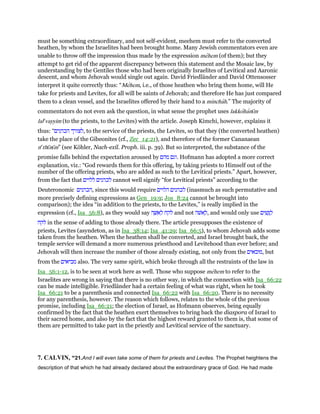
![known that the Church of God should be collected out of all nations, so that, in spite of every difficulty and
obstruction, even distant nations should draw near to them. But now he proceeds further, and instructs
them that the Gentiles shall not only be adopted by God, but shall also be elevated by him to the highest
honor. Already it was a great honor, that unclean and polluted nations were reckoned to be a holy people;
but now here is something far more wonderful, that they are elevated to the highest pinnacle of rank.
Hence we see that the priesthood under Christ is very different from what it was under the Law; for under
the Law one tribe exclusively was admitted to the priesthood, and the Gentiles, as unclean, were so far
from having it in their power to discharge that priesthood, that they were even forbidden to enter into the
temple; but now all are admitted without distinction. Some expound this passage in a general manner,
that the Gentiles shall be priests; that is, shall offer themselves to God, as Scripture frequently
denominates all believers “ royal priesthood.” (1Pe_2:9; Rev_1:6.) But he appears to describe in an
especial manner ministers and teachers whom the Lord also chose from among the Gentiles, and
appointed to execute this distinguished office; that is, to preach the Gospel; such as Luke, Timothy, and
others of the same class, who offered spiritual sacrifices to God by the Gospel.
22
“As the new heavens and the new earth that I make
will endure before me,” declares the LORD, “so will
your name and descendants endure.
1.BARNES, “For as the new heavens and the new earth - (See the notes at Isa_65:17).
Shall remain before me - They shall not pass away and be succeeded by others. The idea
is, that the state of things here described would be permanent and abiding.
So shall your seed and your name remain - (See the notes at Isa_65:15).
2. KELLY, “Hence it is obvious that the ordinary strain of argument and interpretation, popular
from the days of Origen and Jerome down to the present, is founded on a total confusion of things
that differ. Christianity no doubt is very distinct; but that the new age must be a repetition of the
same aims, principles, and ways, is an error quite as great as that which fancies the gospel to be only a
continuation of the law with a great accession of better privileges. Israel shall be established for ever
before Jehovah. "For as the new heavens and the new earth which I will make shall remain before me,
saith Jehovah, so shall your seed and your name remain. And it shall come to pass, [that] from new](https://image.slidesharecdn.com/isaiah66commentary-150114082304-conversion-gate01/85/Isaiah-66-commentary-130-320.jpg)






